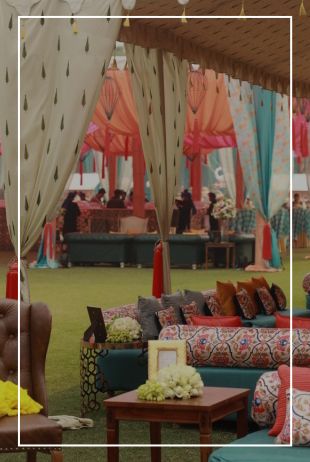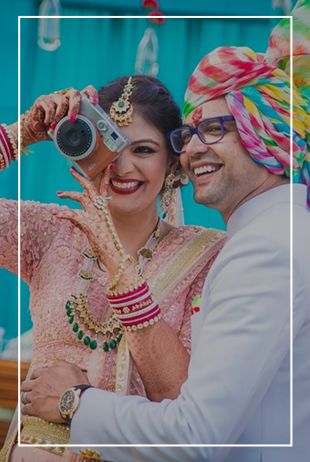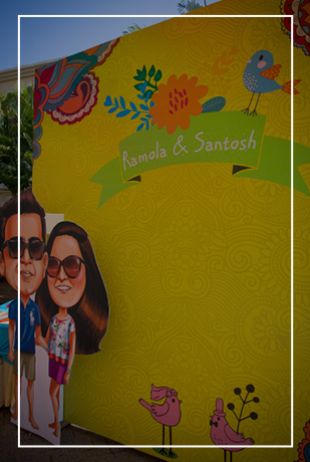101 Guide on Bridal Maharashtrian Jewellery!
BY Apoorva | 30 Jun, 2025 | 96151 views | 10 min read
Maharashtrian jewellery has a unique charm of its own. From its signature patterns and designs to its little intricacies, it always has us mesmerised. Embark on a journey through the captivating world of Maharashtrian jewellery, where every piece tells a story of tradition and craftsmanship. The signature patterns and designs woven into each ornament create a mesmerising tapestry of culture and heritage.
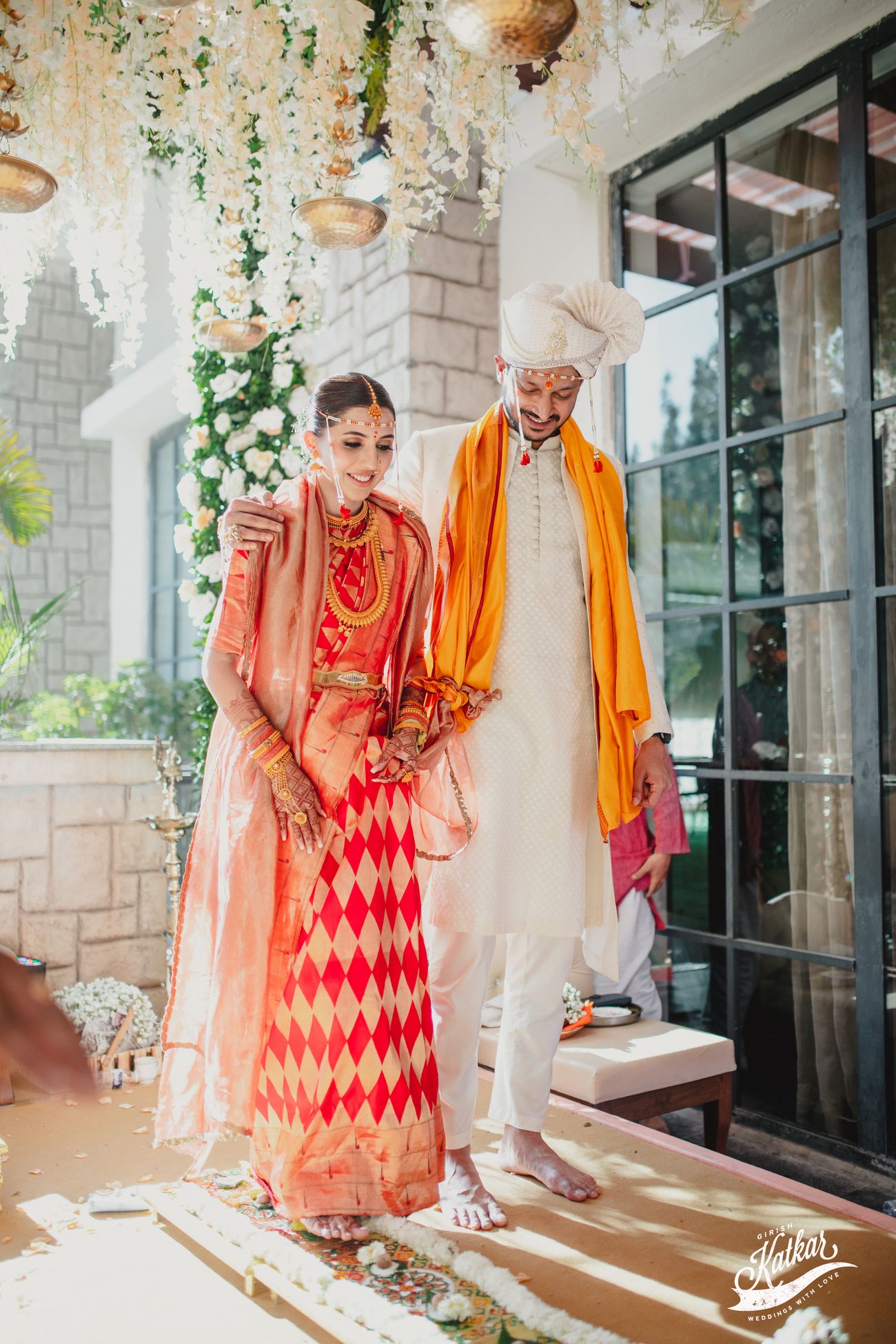
Image via Vedhika and Kamlesh
So we decided to share a complete 101 guide on what are the different types of traditional Maharashtrian jewellery that a Maharashtrian bride dons on her wedding day. From head to toe, we have you covered!
Lakshmi Haar / Putli Haar
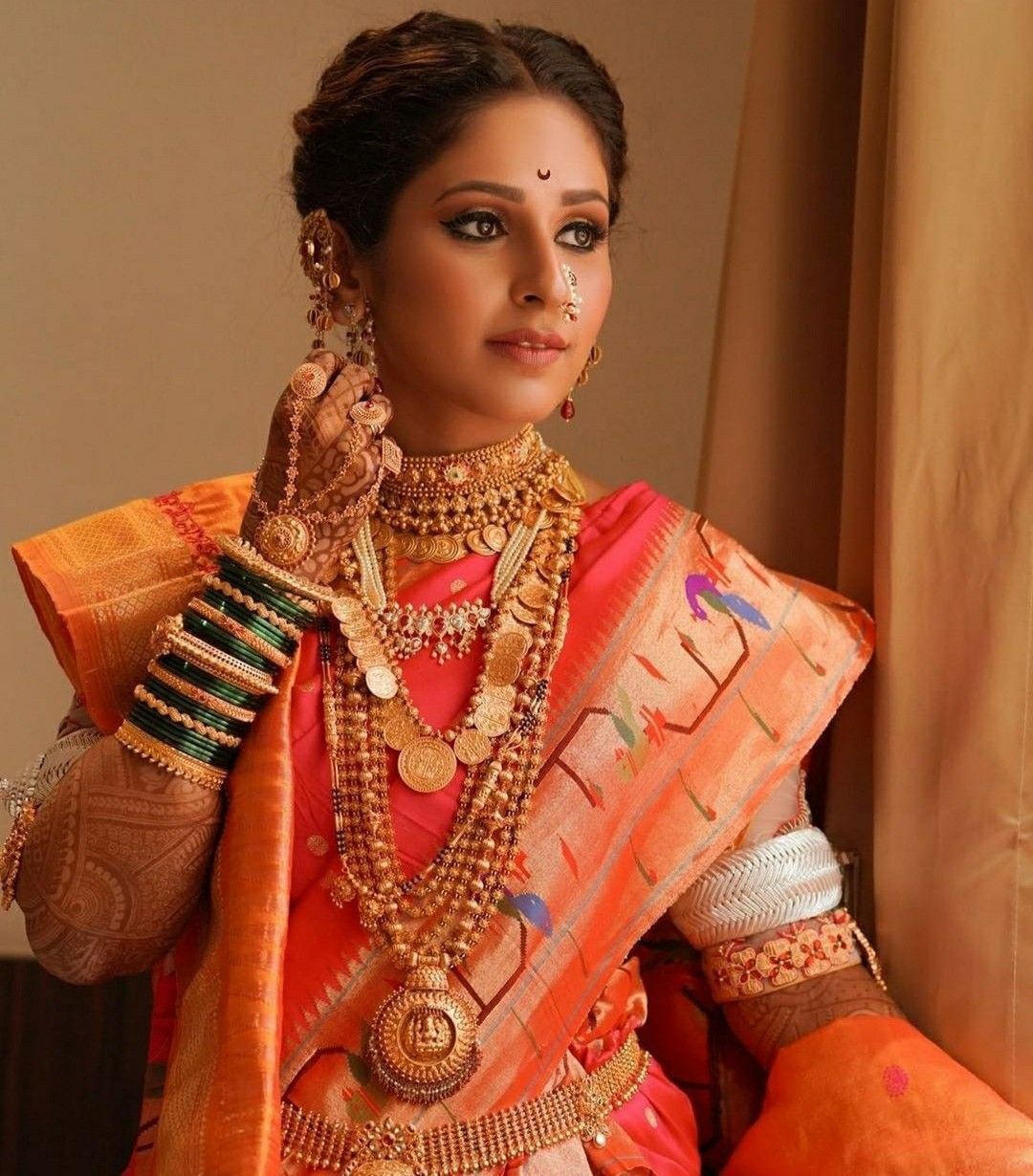
Image via Pinterest
This iconic necklace features multiple coins or flat gold discs with engravings of Goddess Lakshmi, symbolising prosperity and divine blessings. Whether it's the Putli Haar (named after the coin-like "putlis") or the more detailed Lakshmi Haar, these pieces are both spiritual and opulent, making them a popular choice for the wedding ceremony itself.
Mundavlya

Image via Vakt Photography
One of the most essential accessories for a Maharashtrian bride & groom. It is a string-like ornament made of pearls or flowers (sometimes both), that is tied horizontally across the forehead with two vertical strands falling on either side of the face. It’s usually tied during the muhurta (auspicious moment) before the wedding rituals begin. Traditionally, it is made with pearls strung on a golden thread, but nowadays, you’ll also see versions made of real flowers, gold chains, or even beaded variations for a modern touch.
Bor Maal
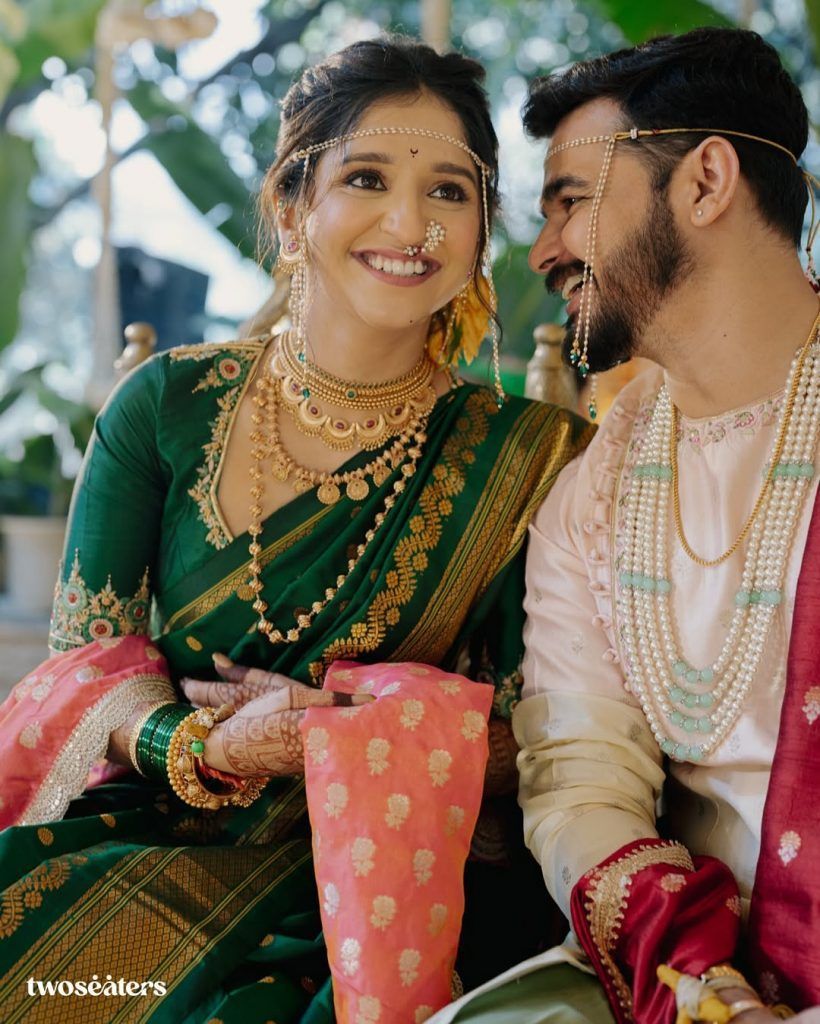
Image via Two Seaters
A beautiful and lightweight gold necklace inspired by the bor fruit. It features small gold balls (bori-style beads) strung together in neat symmetry. Brides often wear it during pre-wedding functions or pair it with heavier pieces like Kolhapuri Saaj to add dimension without overwhelming the look.
Surya Haar
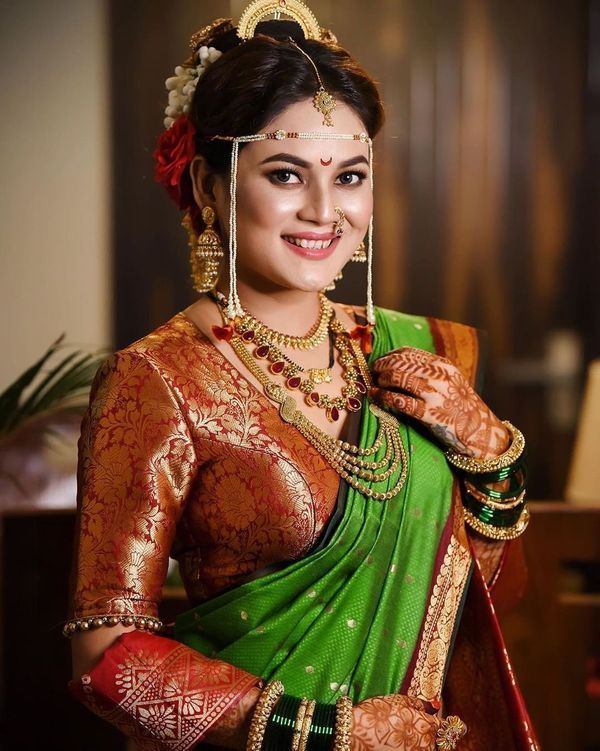
Image via Instagram
A regal necklace named after the sun (Surya), this haar features a bold circular pendant symbolising radiance, power, and divine energy. Traditionally worn by royalty, the Surya Haar is usually crafted in gold with intricate carvings and is worn as a long necklace, often layered with chokers or mid-length pieces for a rich bridal look.
Kolhapuri Belpan Tik
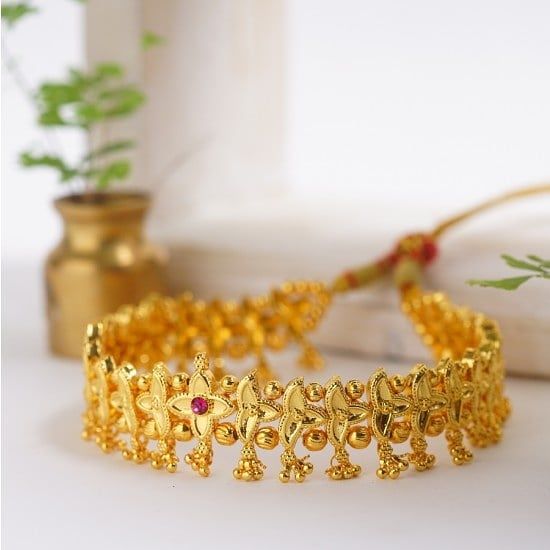
Image via Aadya Singapore
A traditional necklace design from Kolhapur that features a distinctive design inspired by the bel (bilva) leaf. Often encrusted with small stones or pearls, this tikka pairs beautifully with bold eye makeup and a Brahmani Nath.
Kolhapuri Saaj
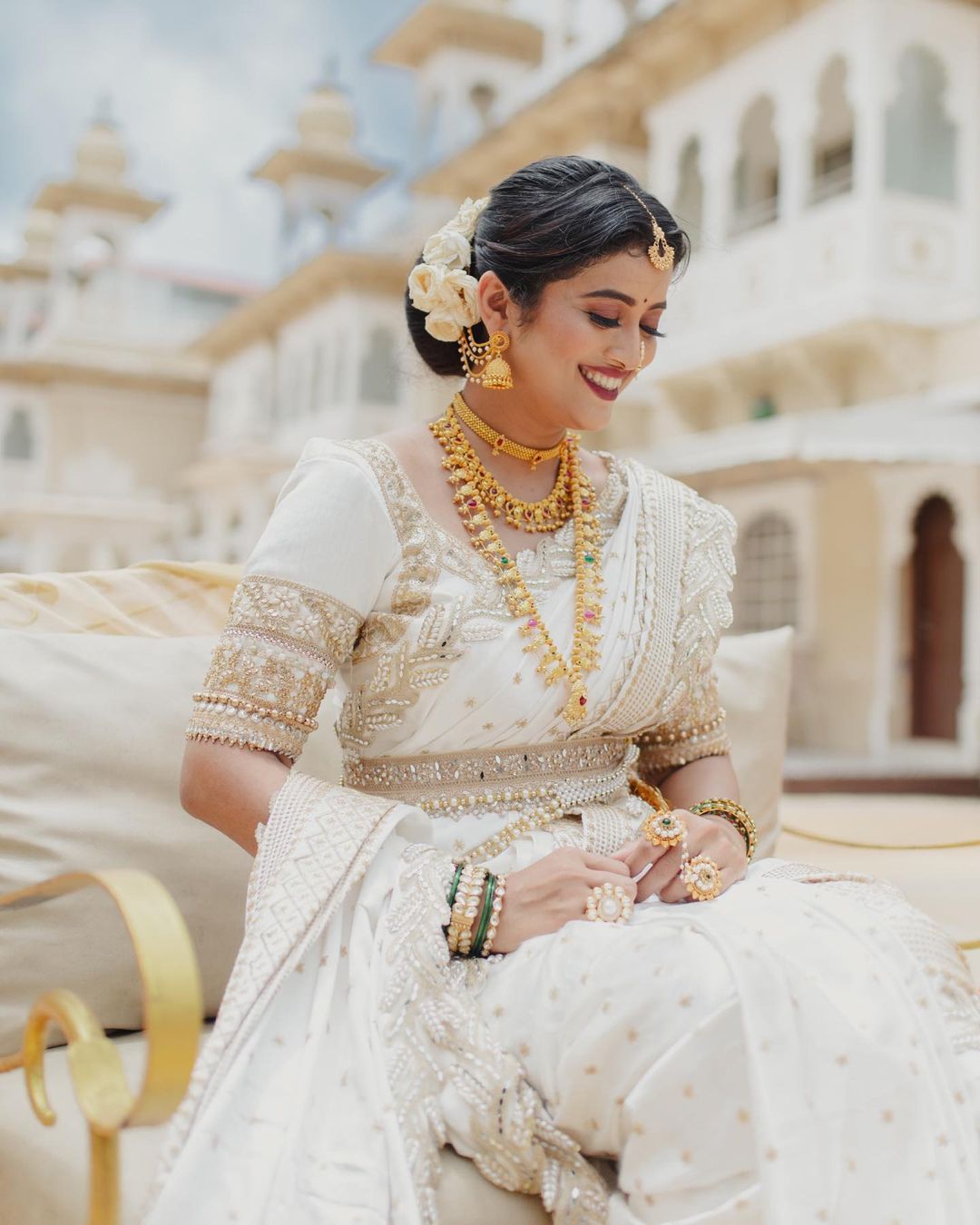
Image via Girish Katkar Photography
One of the most popular and stunning looking designs when it comes to marathi jewellery,. The kolhapuri saaj It is made with jav mani (golden beads) and 21 leaf-shaped pendants. Every pendant has its own meaning. Out of these 21 pendants, 10 pendants define the ten avatars of Lord Vishnu, 2 pendants have ruby and emerald stones, 8 pendants are for ashtamangal (ashta means eight and mangal means good) and the last pendant is a taviz.
Bakuli Haar
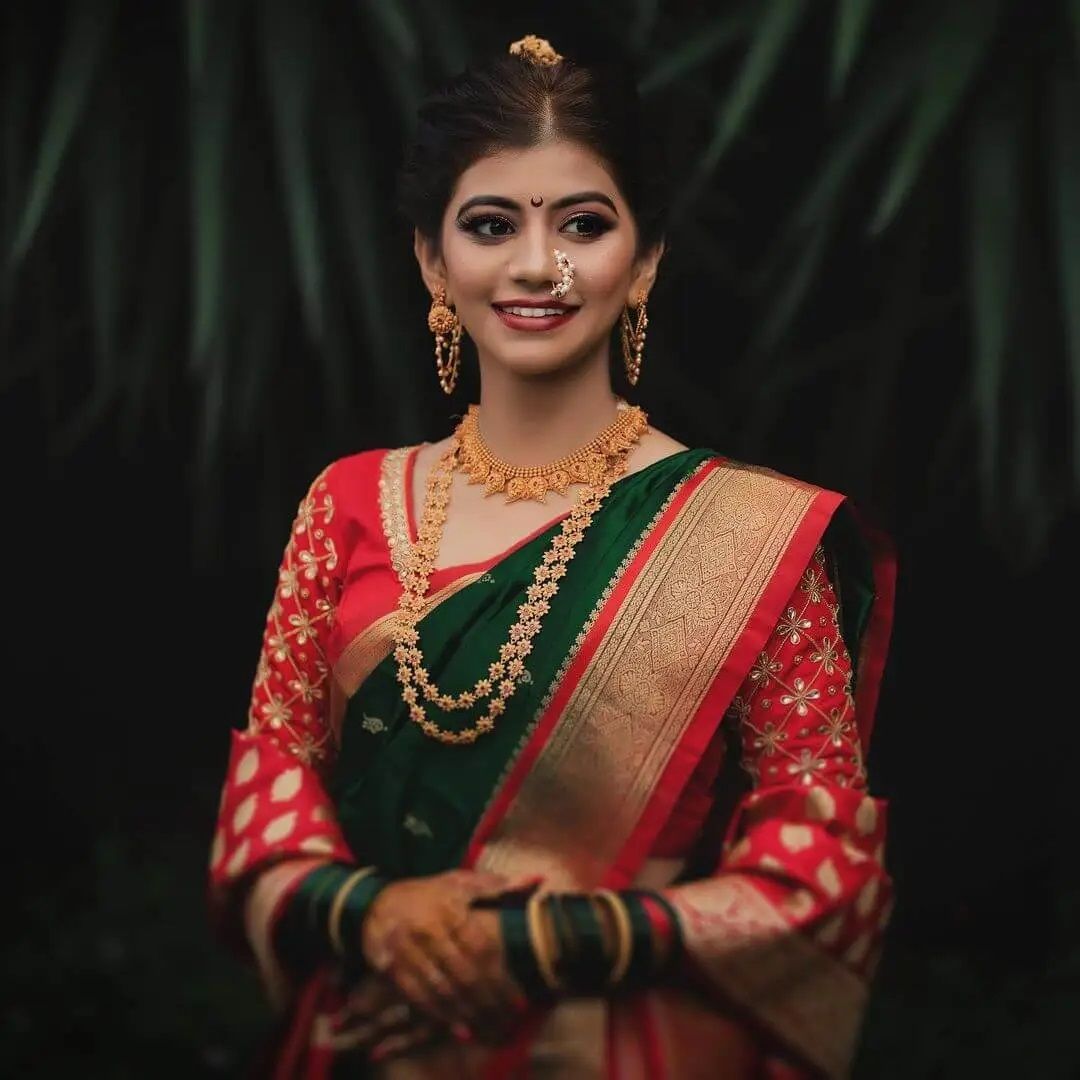
Bakuli Cha Haar" stands as a cherished Maharashtrian necklace, carrying profound cultural value and frequently gracing special events and festivals. Distinguished by its intricate artistry, this necklace is a replication of the bakuli flower (bel phool) and looks so elegant and classy!
Brahmani nath
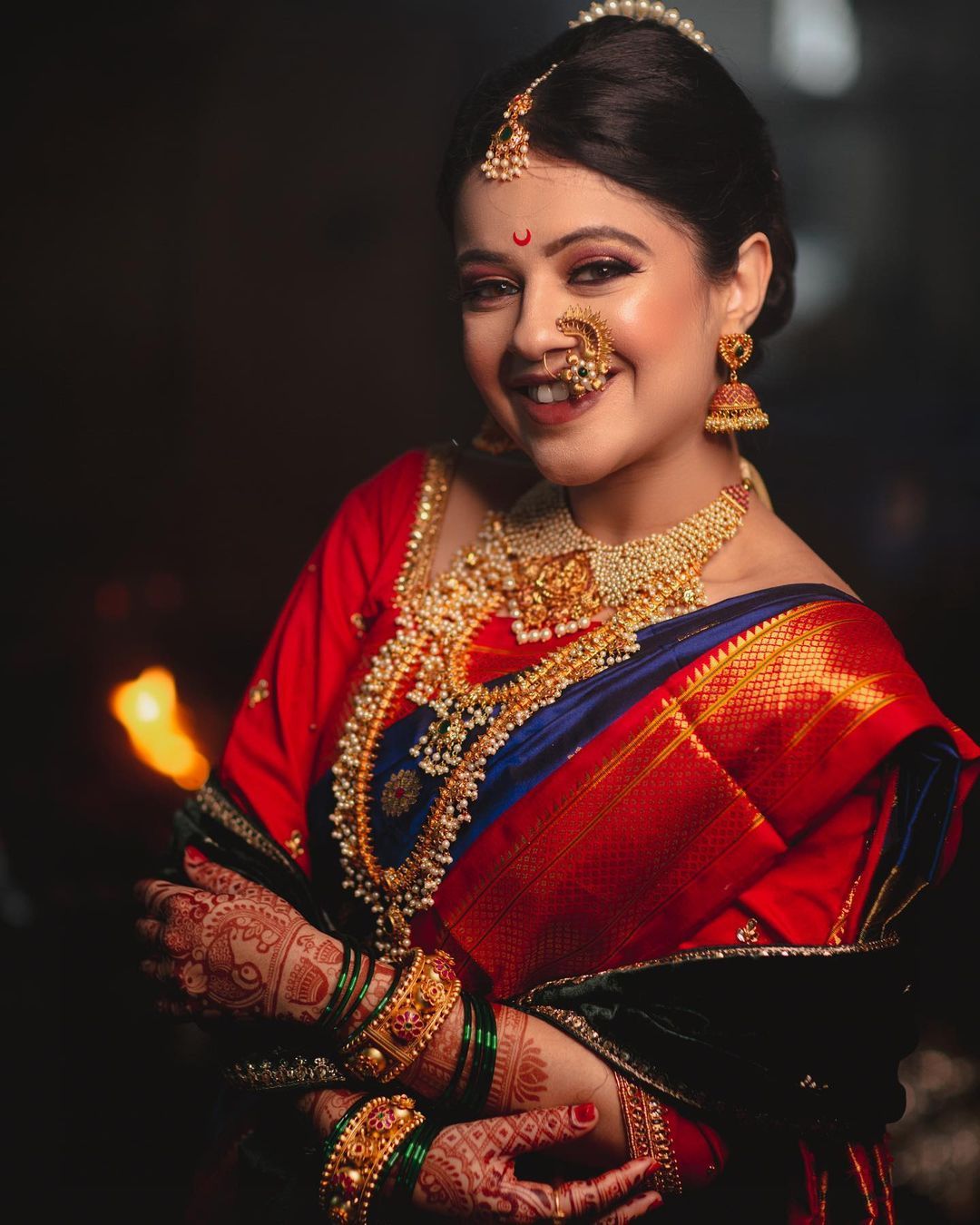
Image via Girish Katkar Photography
The Maharashtrian nose ring, known as the "nath," is renowned for its distinctive design. Unlike conventional pin or ring-shaped nose pins, the Maharashtrian nath takes the form of a bow. Typically crafted with pearls, rubies, or emeralds, these Brahmani naths come in diverse shapes and sizes.
Historically, these ornate nose rings were a symbol of a family's prosperity, serving as an indicator of their wealth. Many individuals opt for Brahmani naths made from real gold, adorned with pure pearls and diamonds, further emphasizing their cultural and aesthetic significance.
Kambarpatta
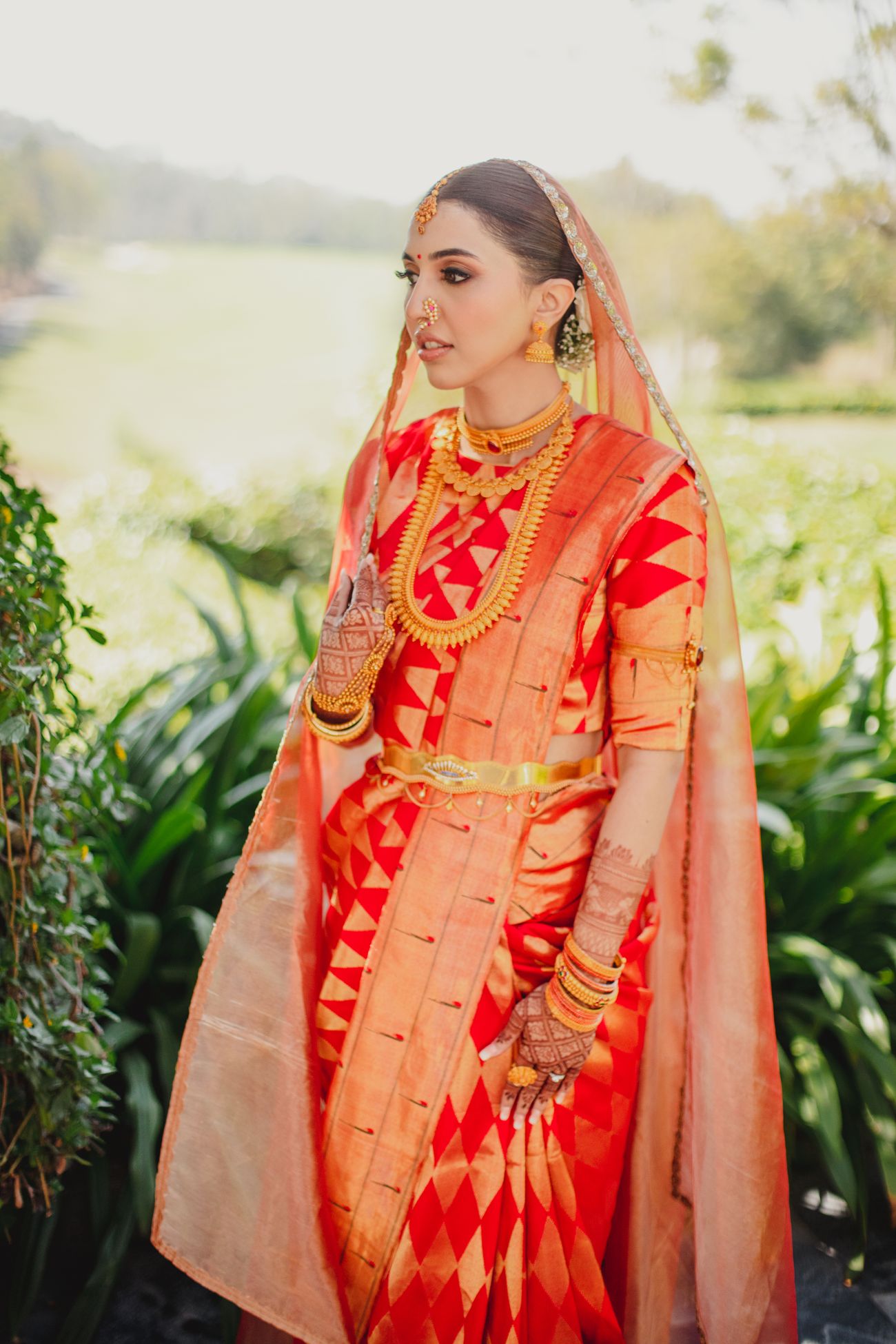
Image via Vedhika and Kamlesh
A Maharashtrian kambarpatta is a kamarbandh or gold belt that is worn by the bride over the saree on her waist. It's made with variety of metals and has a huge array of designs.
Kolhapuri Thushi
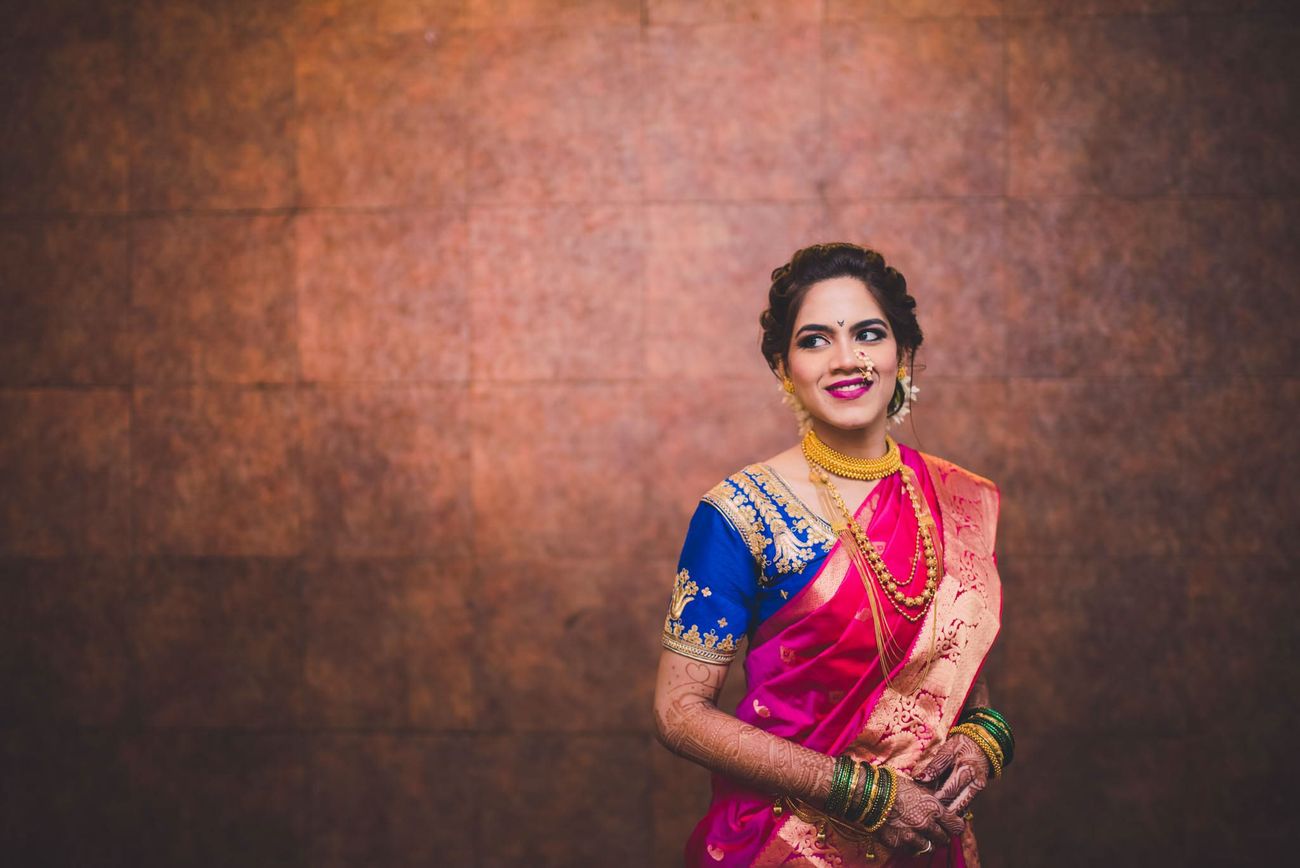 Image via Maharashtrian Bridal Looks
Image via Maharashtrian Bridal Looks
Kolhapuri Thushi is a choker style necklace in pure gold beads with an adjustable dori at the back. This way this neckpiece can be worn loose or tight, depending on how you want to style it. One of the most popular marathi jewellery styles for bridal jewellery.
Ambada
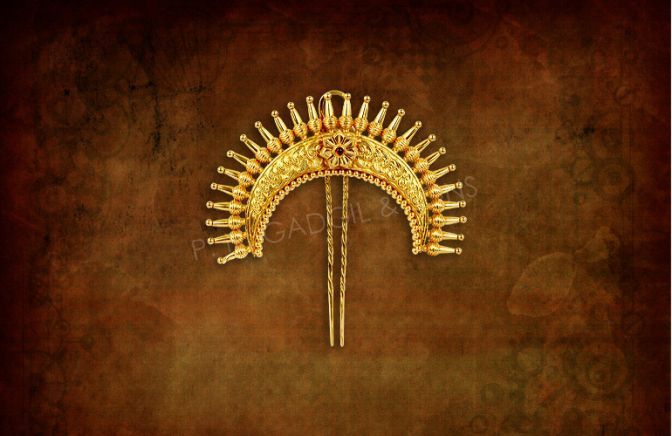
Image via PN Gadgil
This is a bun pin with tassels and embedded stones, used as a hair accessory.
Mohanmaal
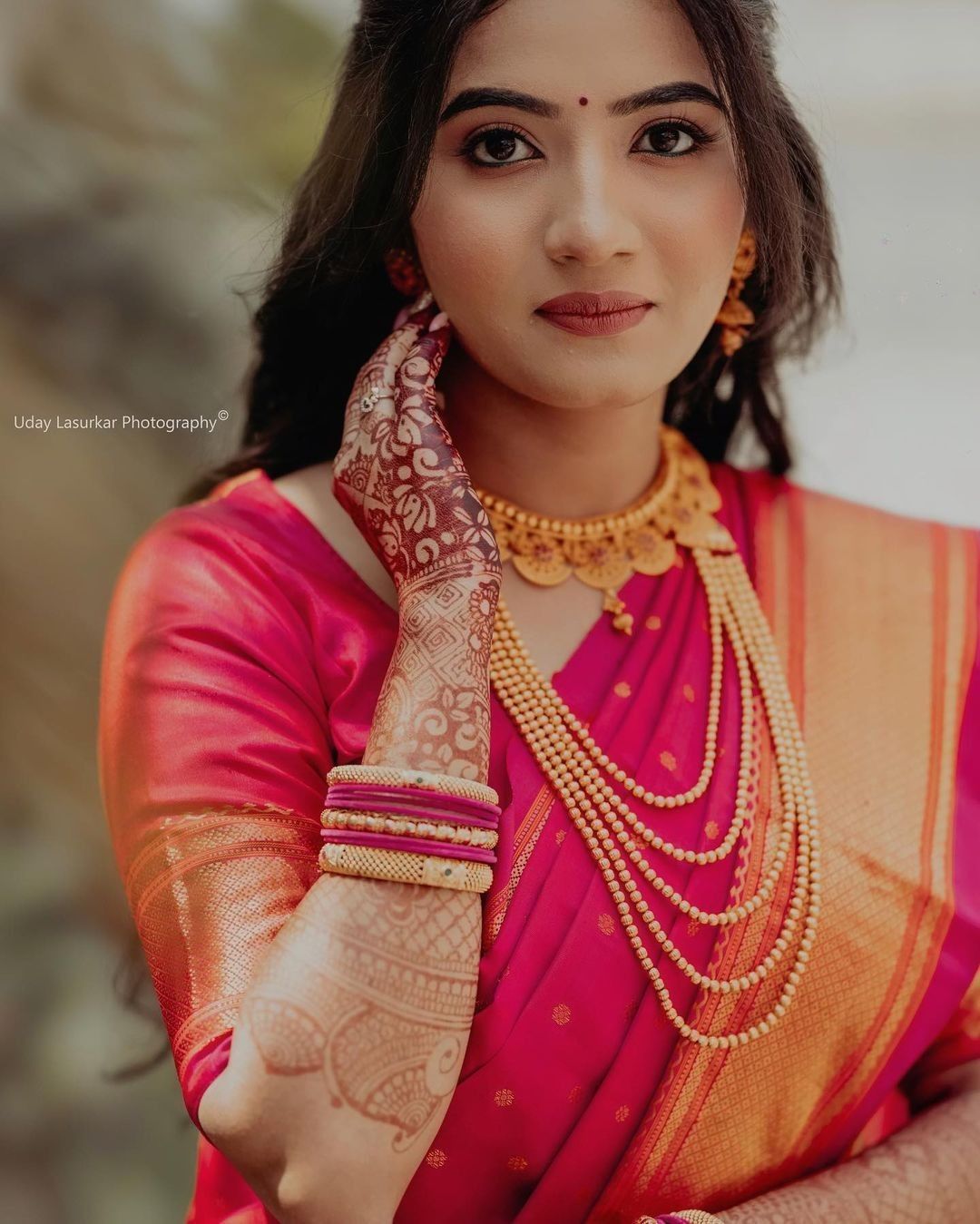
Image via Pinterest
A long necklace with gold beads is called a mohanmaal. Mohan maal (maal means string style necklace) is a layered necklace and layers may vary from 2-8 strings.
Kaan
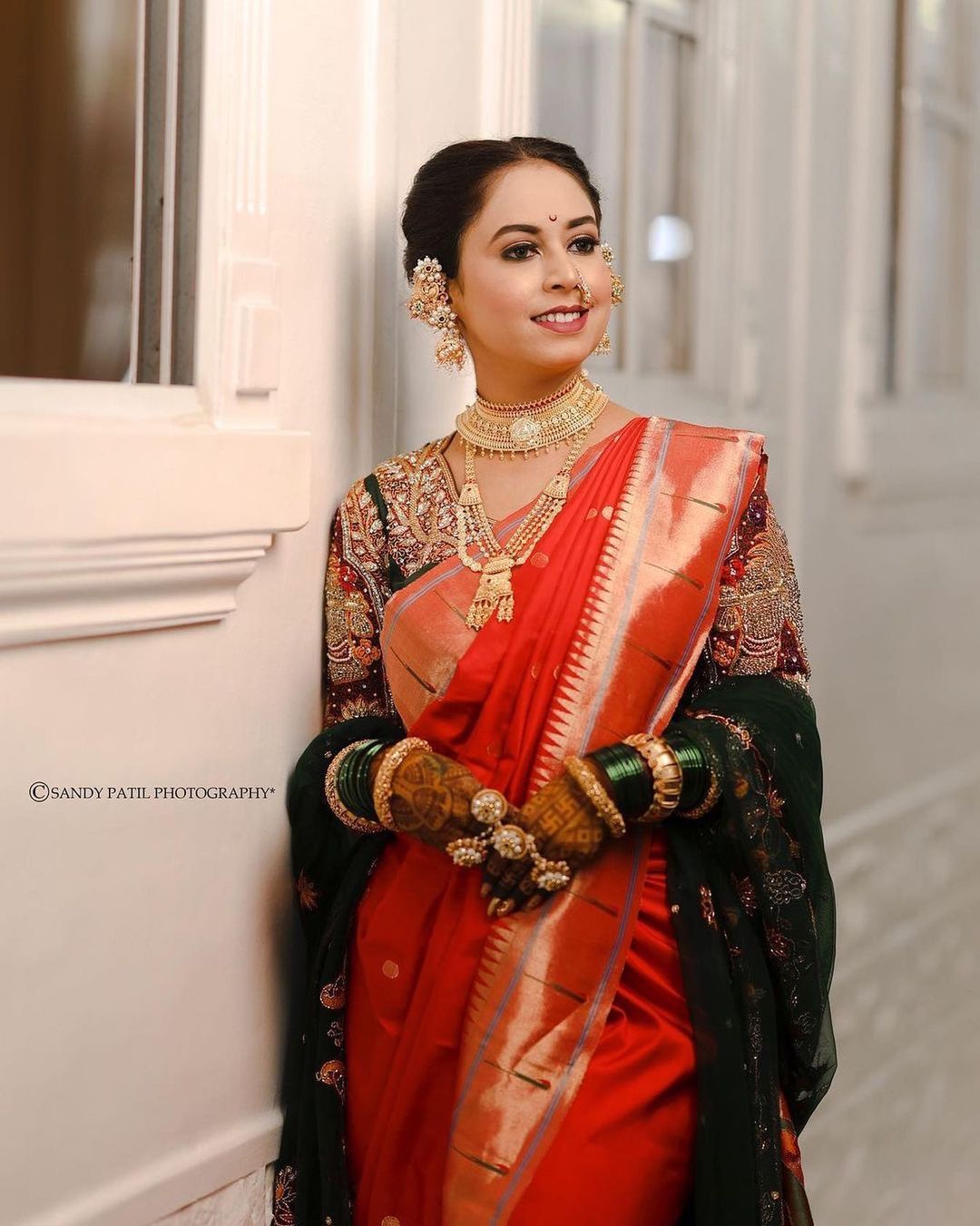
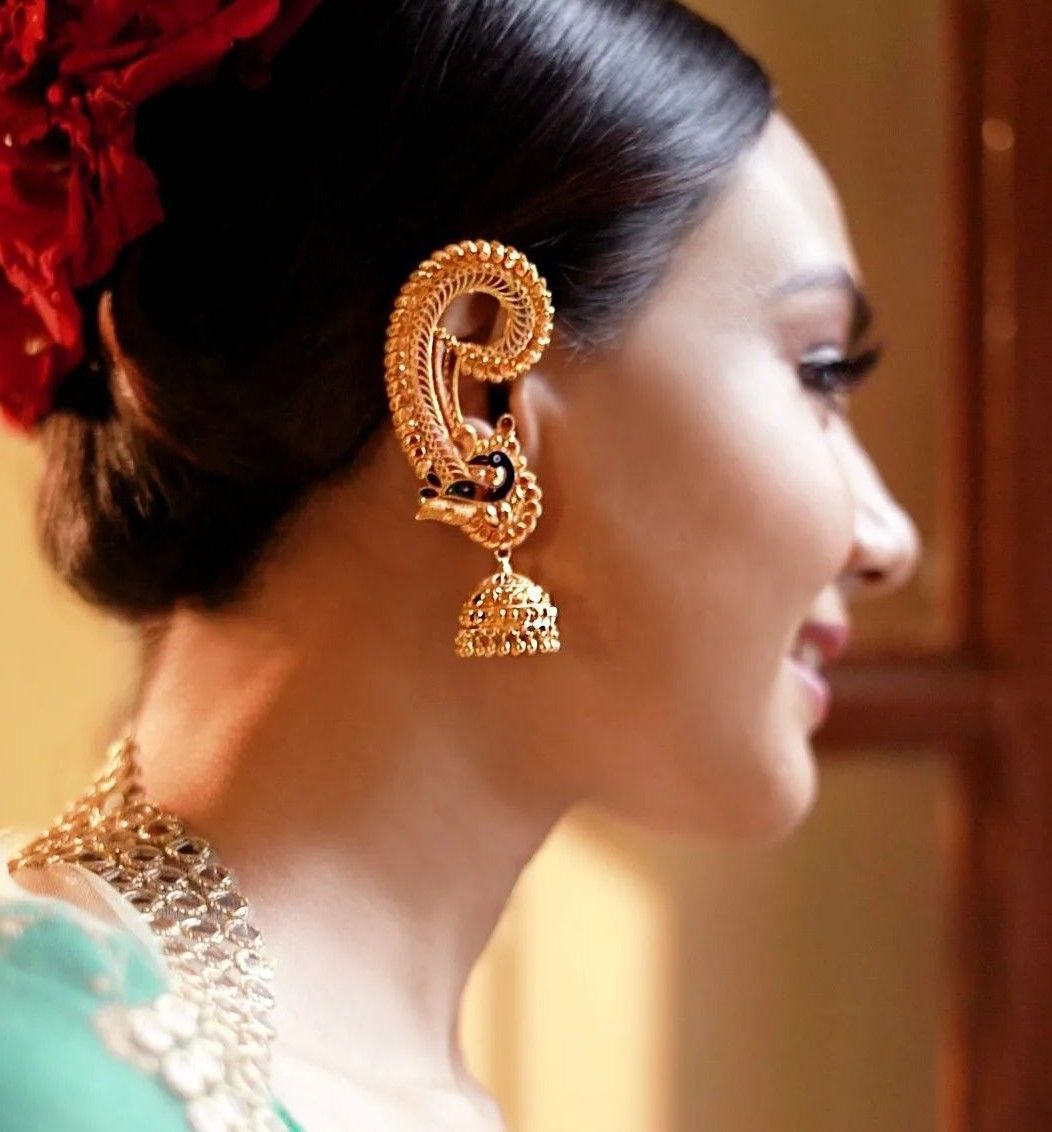
Image via Pinterest
Literally translates to an ear! A traditional ear cuff in all-gold and sometimes with pearls to be worn on your ear.
Rani Haar
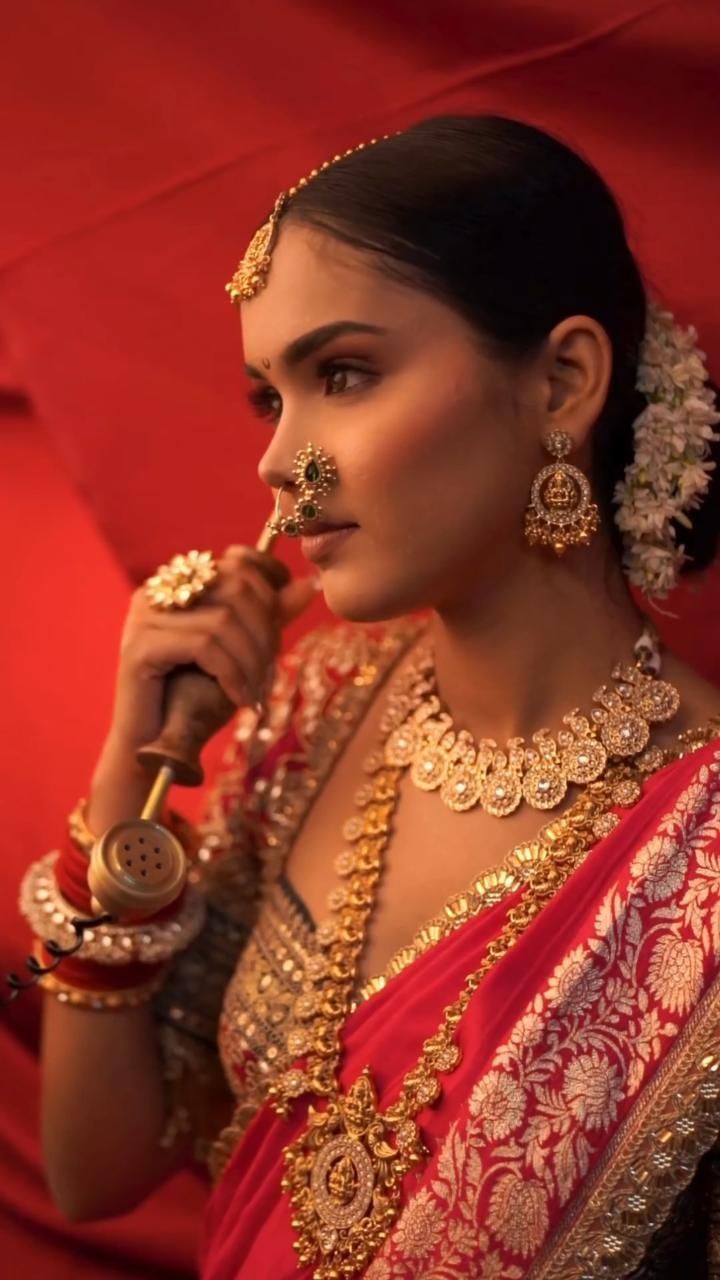
Rani haar is a long pearl necklace set with three layers of pearl string as well as a pendent in the middle.
Vaaki
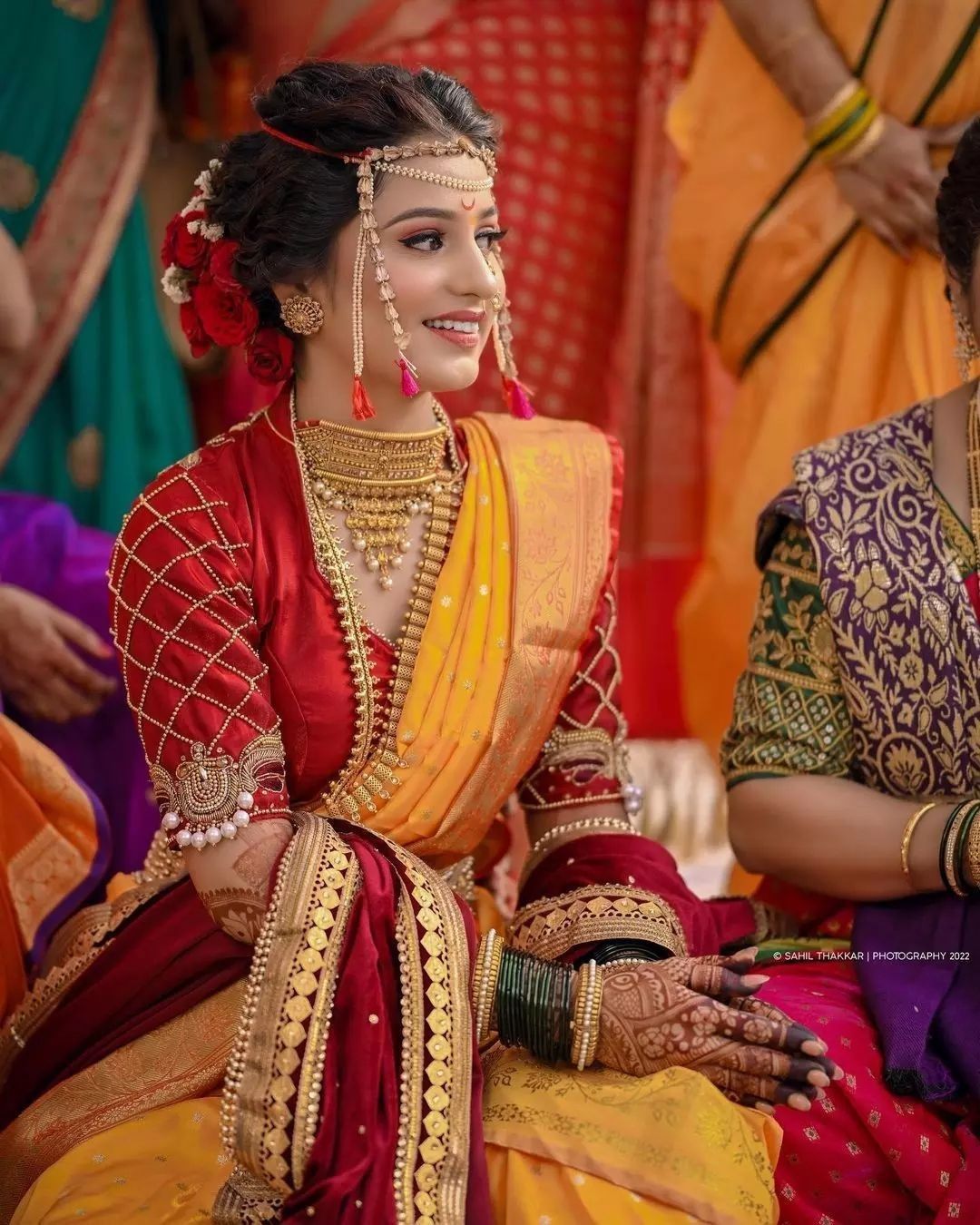
Image via Pinterest
An armlet in all gold with a major precious stone like an emerald, ruby embedded in between and adorned with mini gold chains. It can be worn in either arms or just one too.
Bugadi
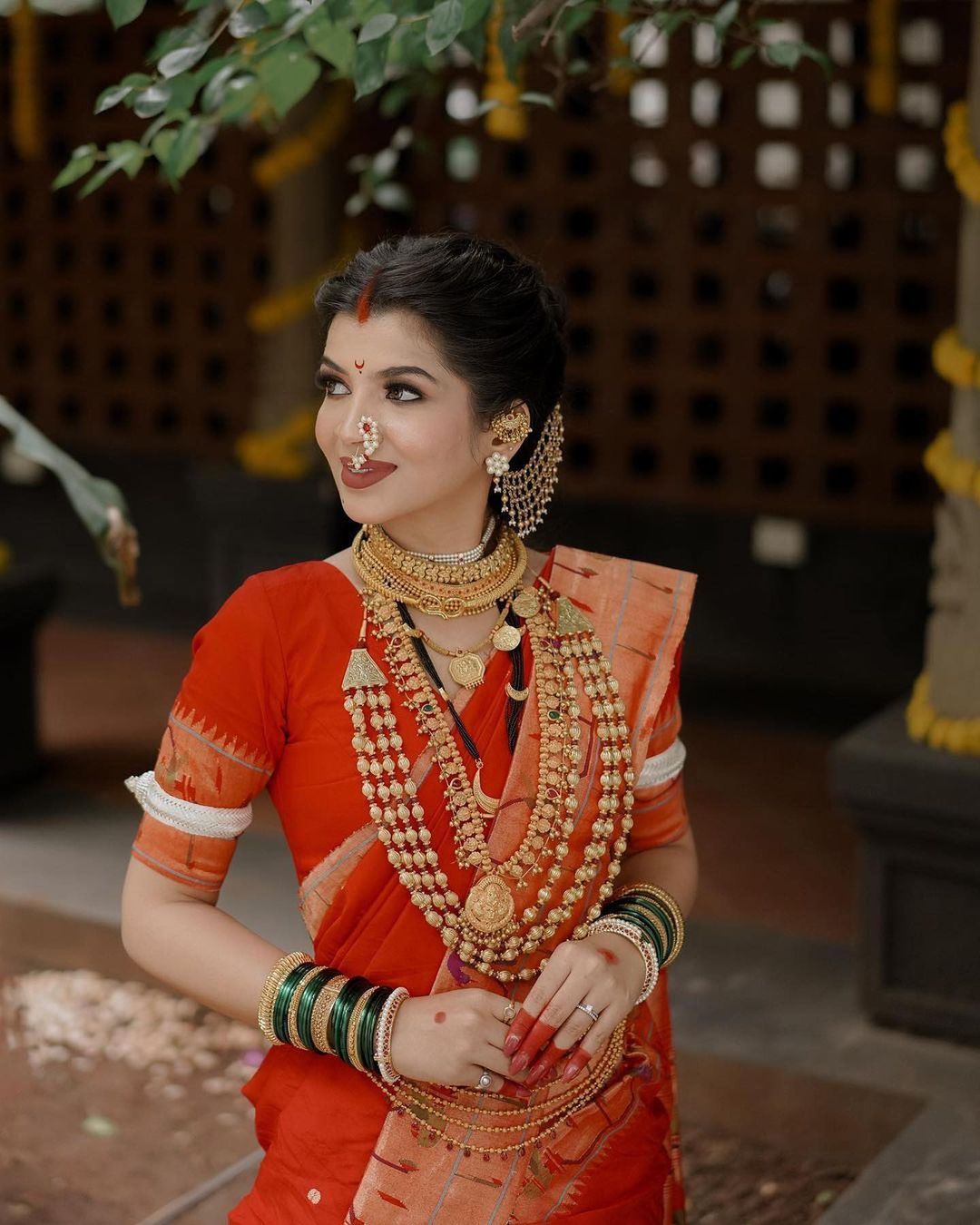
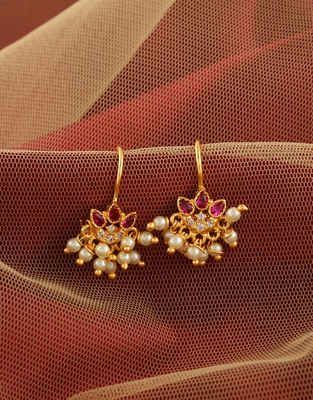
Image via Saga Weddings
An ornament made in all gold and pearls and worn on the ear's helix. You can also get an all-diamond variant in this now.
Hirva Chooda
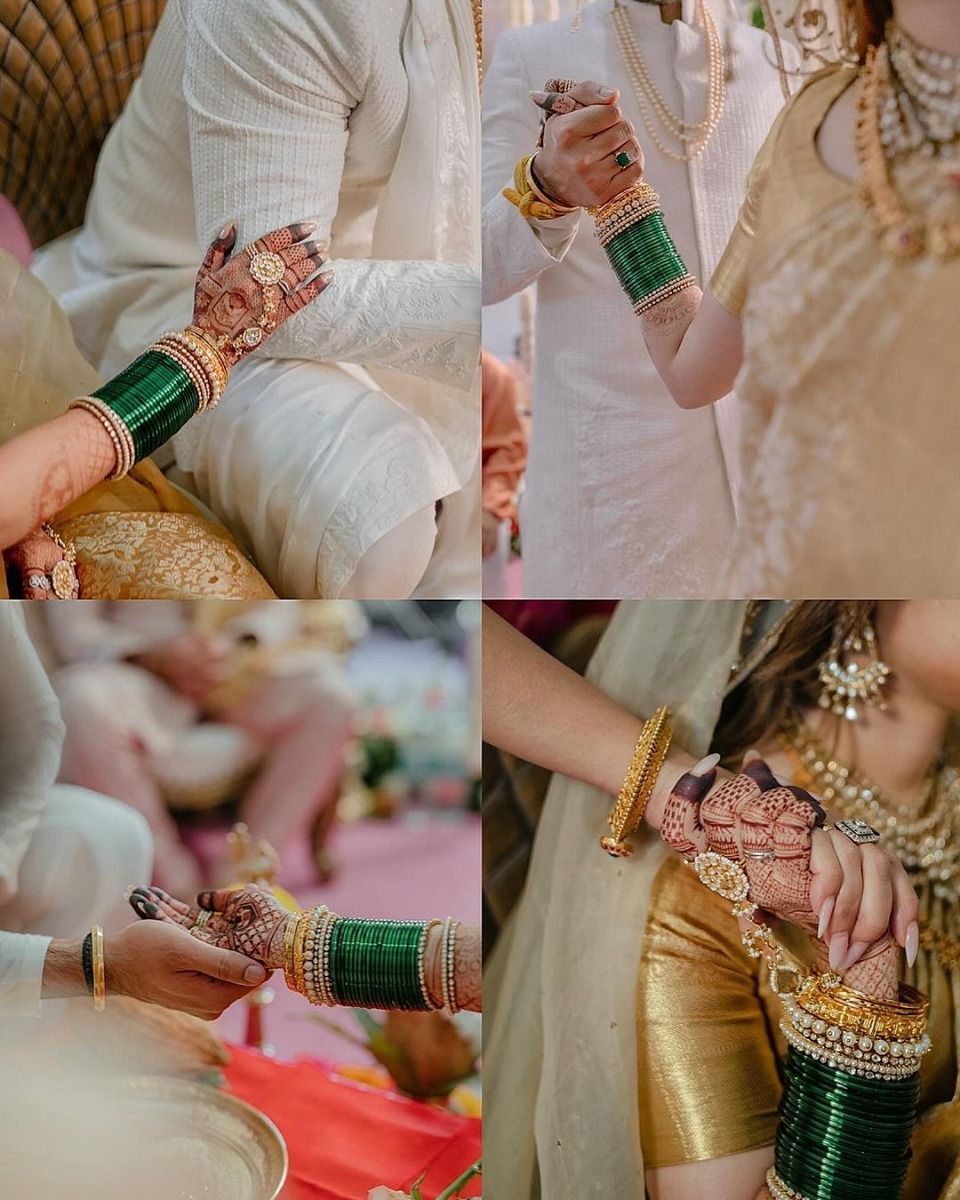
Maharashtrian brides wear a green chuda at their weddings, which are odd-numbered green glass bangles. Green is the symbol of fertility and they are mixed with real gold bangles while wearing them.
Paatlya
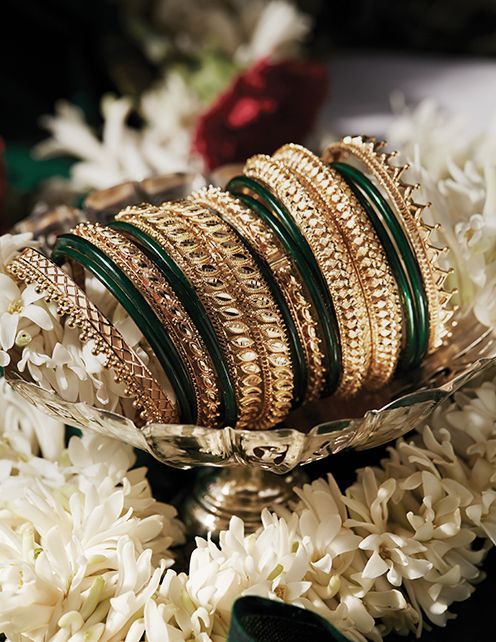
Image via Pinterest
Paatlya are flat bangles with intricate design worn at the start or middle of the hirva chooda. These are usually worn by brides post the wedding too as they are easy to wear and not too heavy.
Chinchpeti
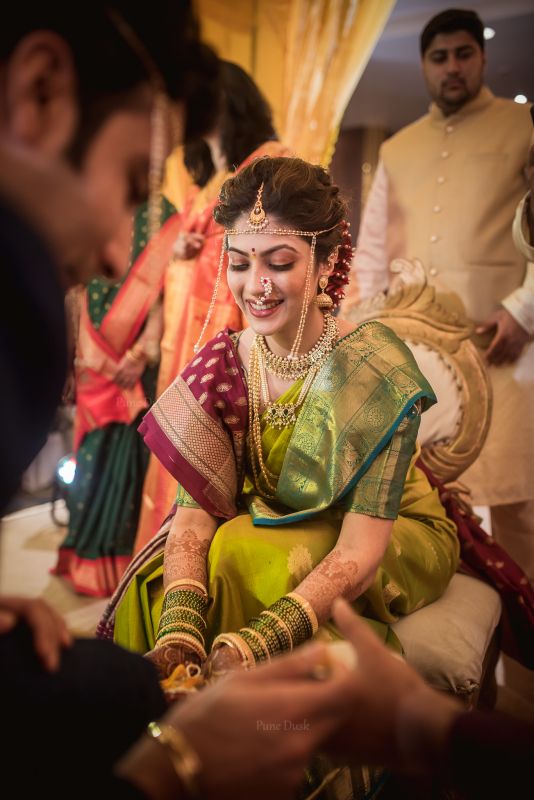
Image via Pune Dusk
It’s a pearl choker necklace interspersed with several decorated pendants. This is perfect for layering your jewellery as this again comes with an adjustable dori.
Tode
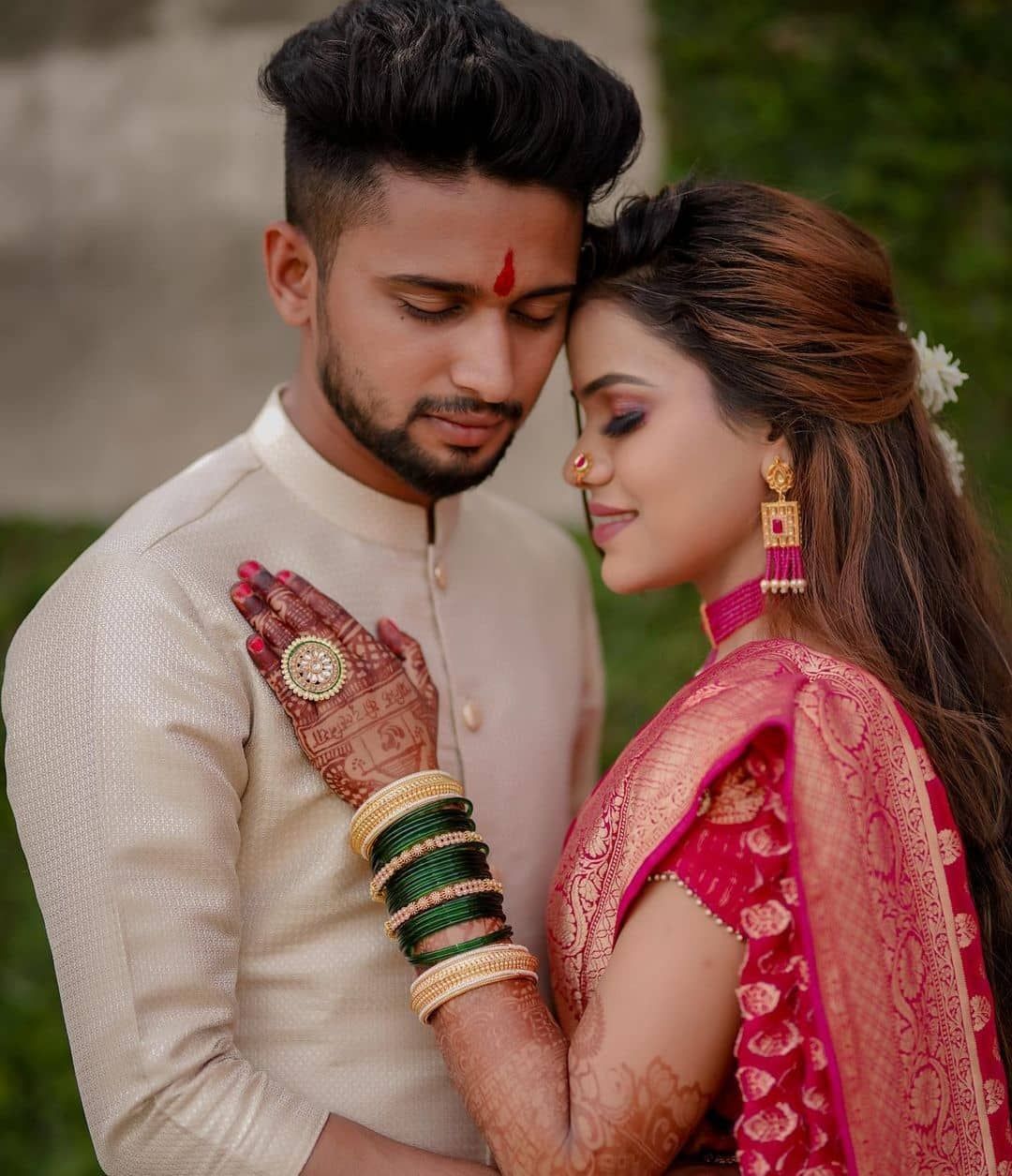
Image via Pratik Bhegde
One of the heaviest bangles in the hands of a Maharashtrian bride, tode are thick bangles/kadas interlinked without any soldering. These are mostly worn at the start or middle of the traditional green chuda worn by brides.
Vaati Mangalsutra
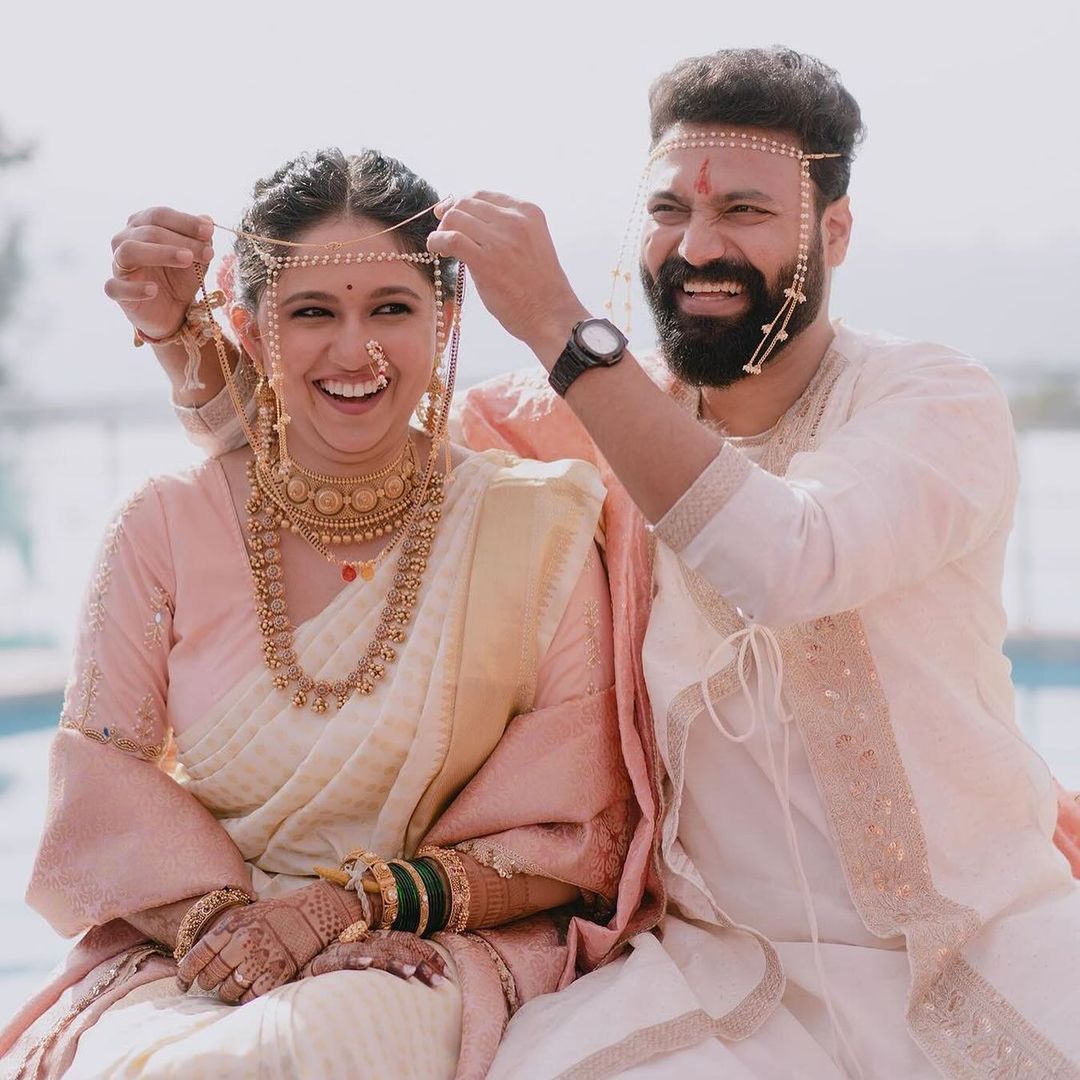
Image via Gautami Deshpande
The traditional Maharashtrian mangalsutra has two vaatis (bowl-type pattern) as a pendant which is strung with black and gold beads. Many brides now opt for a diamond pendant or even other gold pattern pendants instead of the vaati style.
Kudya
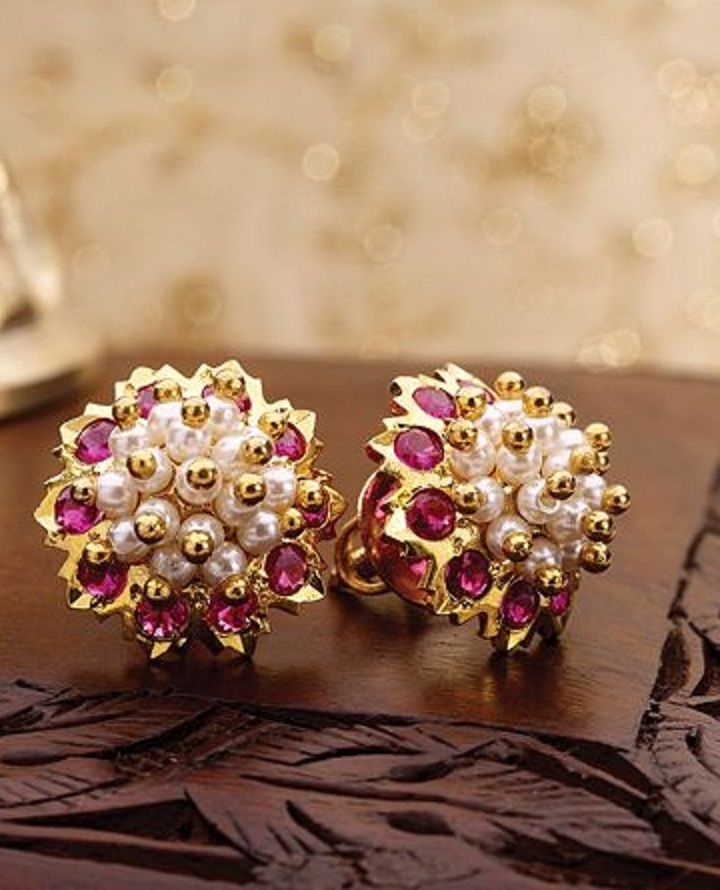
Image via PN Gadgil
Beautifully crafted out of real pearls, this is a favourite ear stud among Maharashtrian brides. Kudi or kudya are also available in diamond and gold in varied patterns.
Pichodi
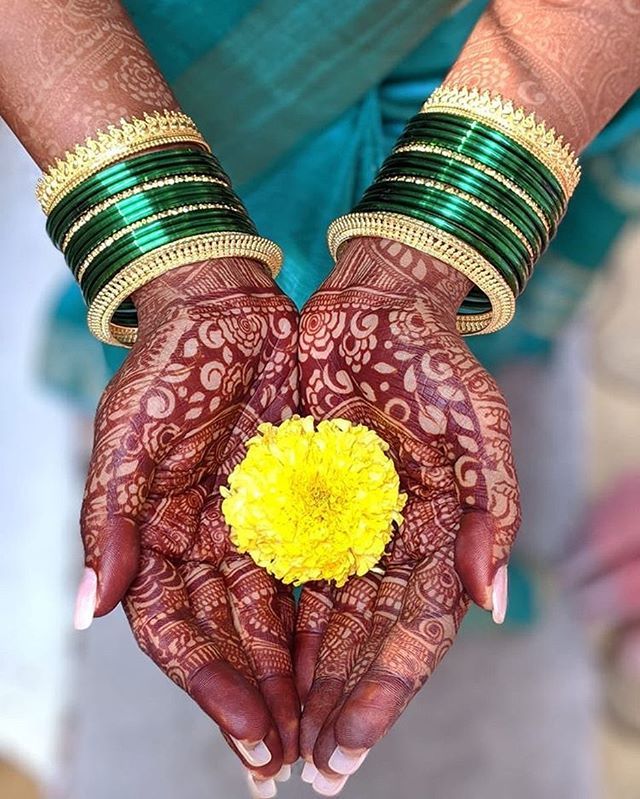
Pichodi are a type of bangles that are worn at the end of the green chooda. The design consists of one smooth round edge and another elaborately carved one, giving it its unique look
Tanmani
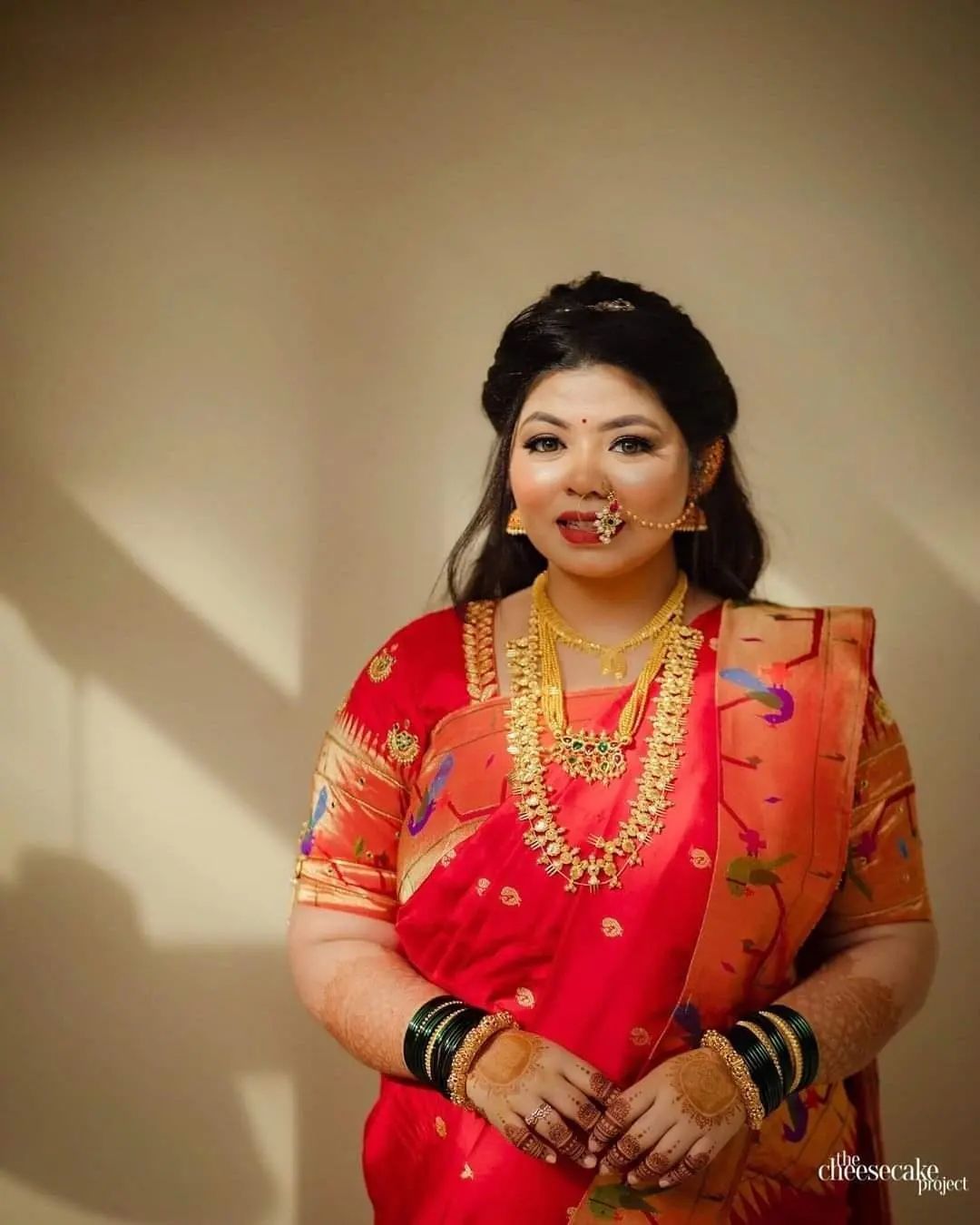
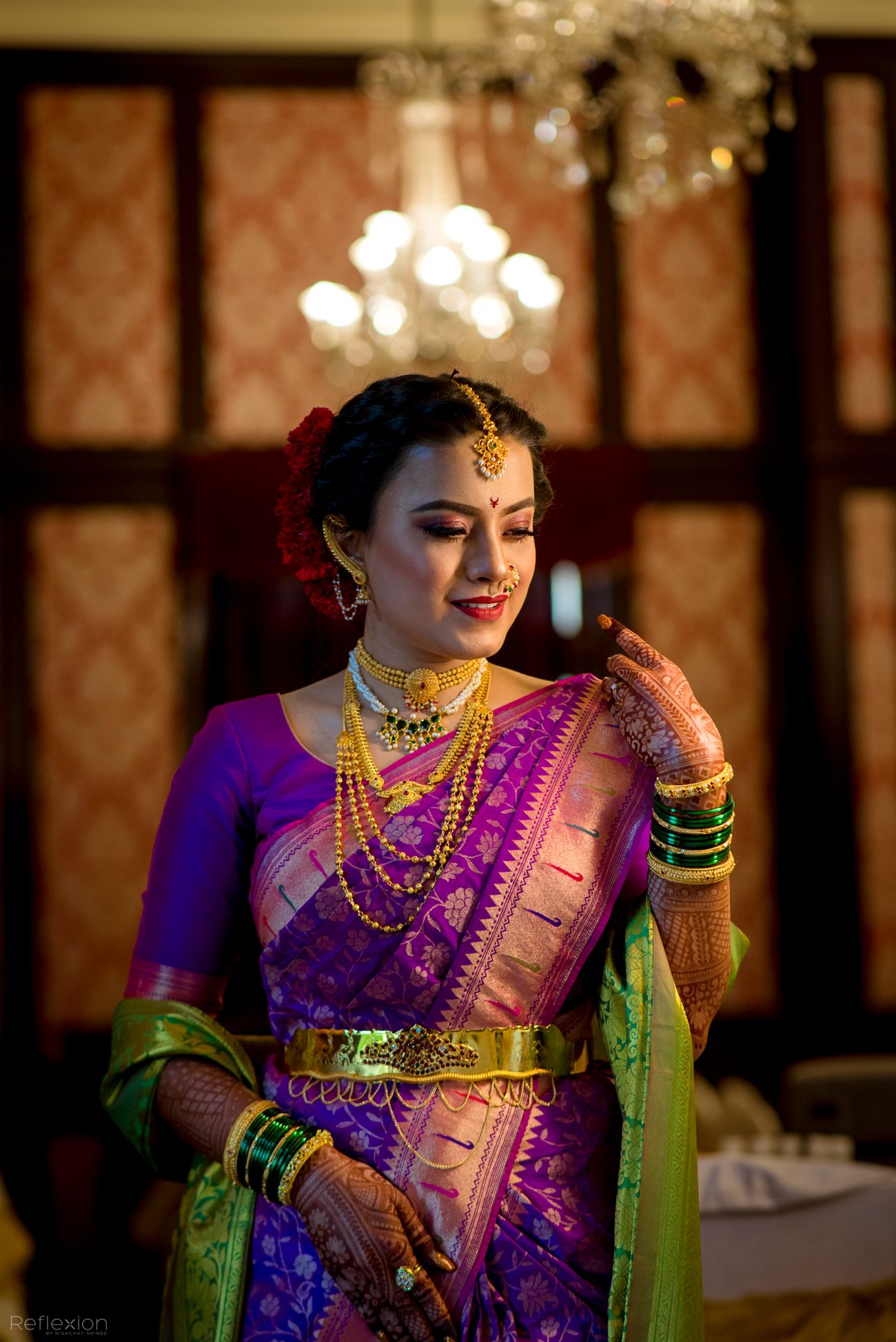
Image via The The Cheesecake Project and BrideMeUp
The tanmani is a classic three or four strings pearl necklace with a pendant in the centre. It’s usually comes in different colours or even a mix, like the navratna. It has an adjustable dori at the back allowing you to wear it at the length of your choice!
Jodvi
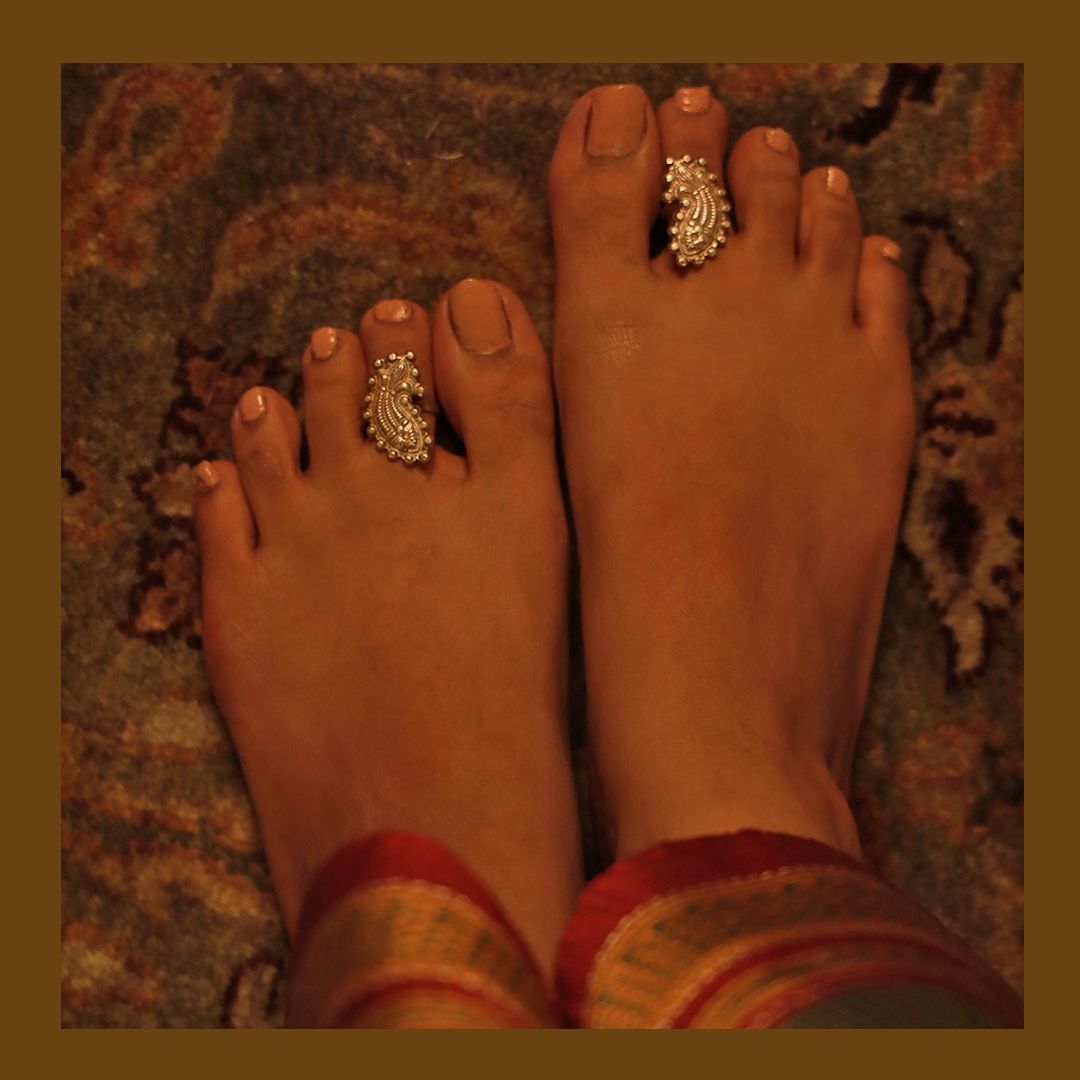
Jodvi is a set of silver toe rings which is gifted by the mother in law to the daughter in law. They are worn in specific toes to activate different pressure points.
Painjan
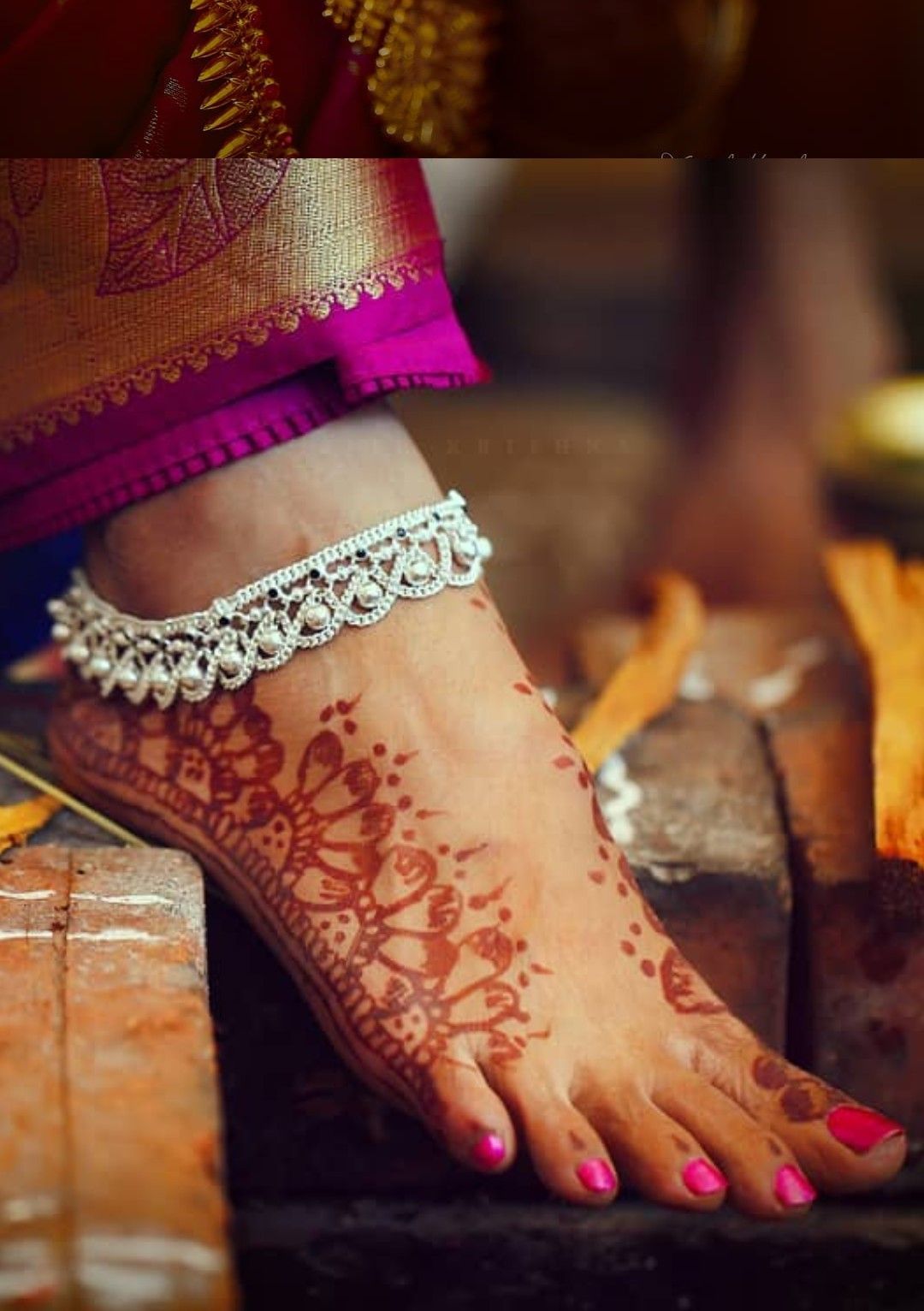
Image via Pinterest
Painjan are anklets made in silver, usually with some ghungroos to be worn on both feet. Maharashtrian brides cannot wear anklets in any other metal traditionally.
Styling Corner: How to Wear Maharashtrian Jewellery Like a Pro
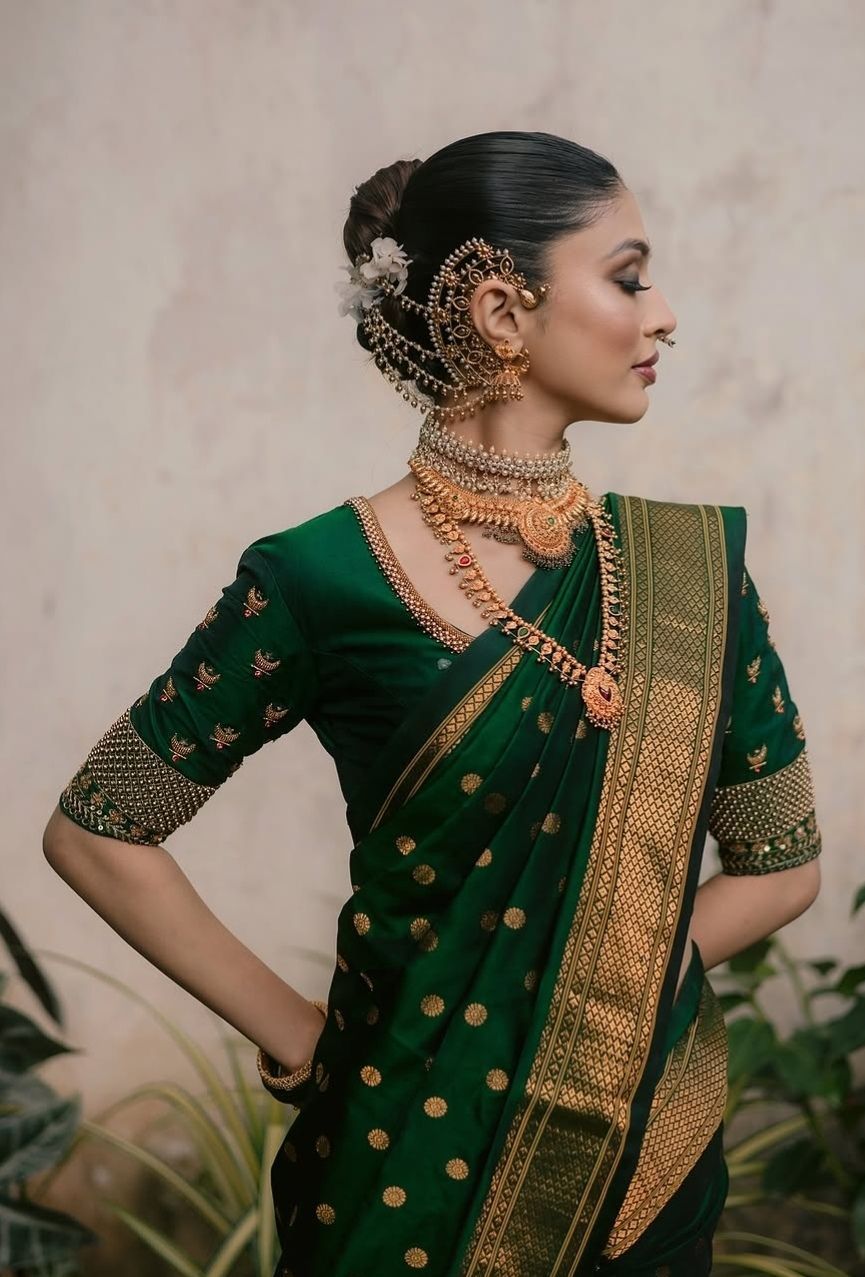
Image via Pinterest
Maharashtrian bridal jewellery is rich, ornate, and incredibly meaningful but styling it right is what takes the look from traditional to timeless. Here are some expert tips on how to style these heirloom pieces with finesse, depending on your saree style and bridal vibe:
Nauvari Saree vs. Six-Yard Saree – What Maharashtrian Jewellery Works Best?
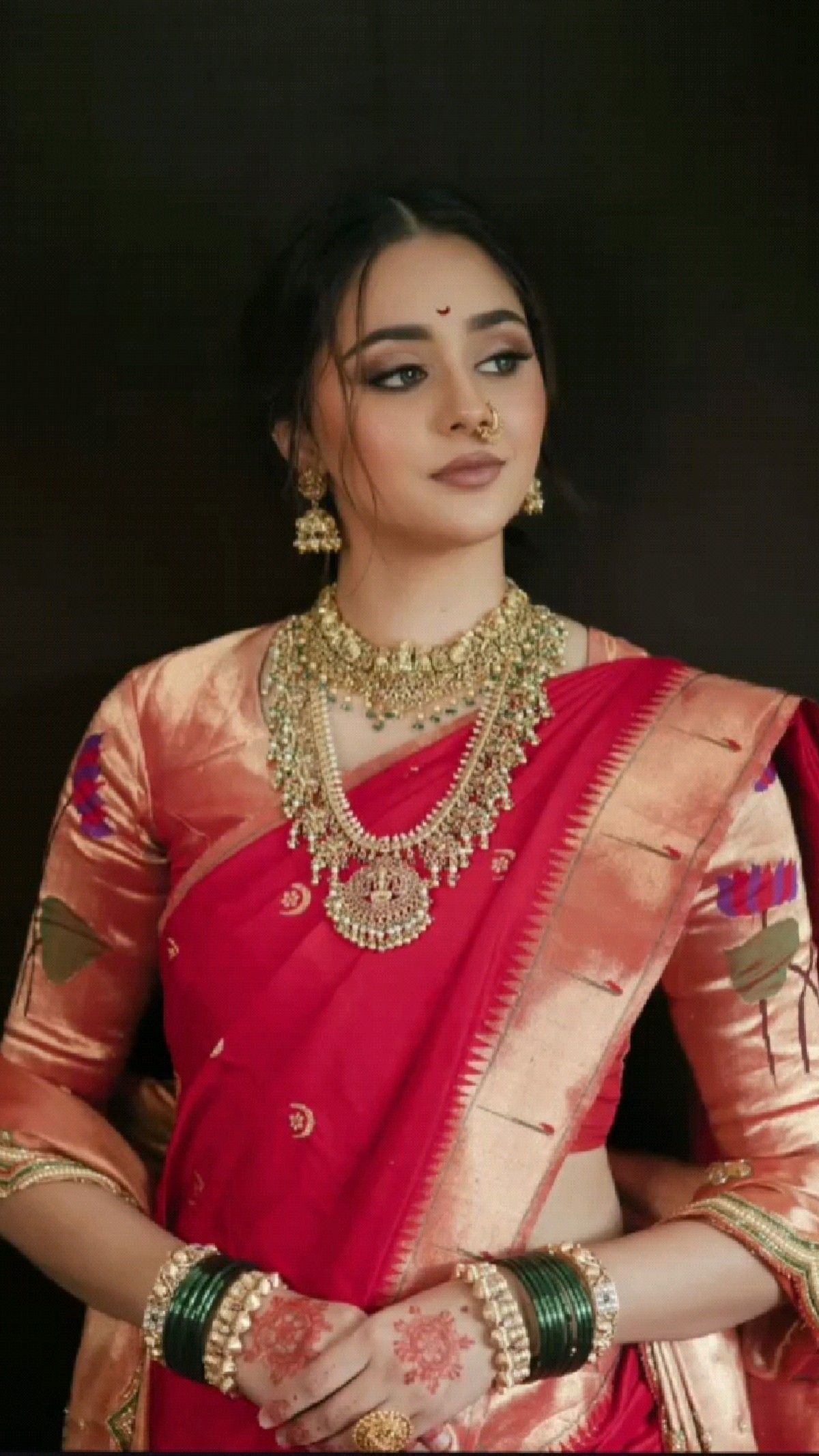
Image via Pinterest
Nauvari Saree (Traditional Drape):
This nine-yard saree is typically worn in a dhoti-style drape, often in vibrant hues like mustard, green, or red.
What Maharashtrian jewellery can you pair it with?
Kolhapuri Thushi or Chinchpeti as a tight choker around the neck
Vaaki on both arms
Bugadi and Kaan to complete the vintage warrior-princess vibe
Kolhapuri Saaj or Tanmani as a layered piece if you want to go bolder
Six-Yard Saree (Classic Bridal Drape):
Often used for reception, muhurtham or post-wedding rituals.
What Maharashtrian jewellery can you pair it with?
A mix of Chinchpeti + Rani Haar for layered elegance
Kudyas or Pichodis in the ears for a dainty touch
Kambarpatta (waistbelt) to accentuate the silhouette
Ambada or hair accessory to tie in the look
Layering Maharashtrian Jewellery Without Overdoing It
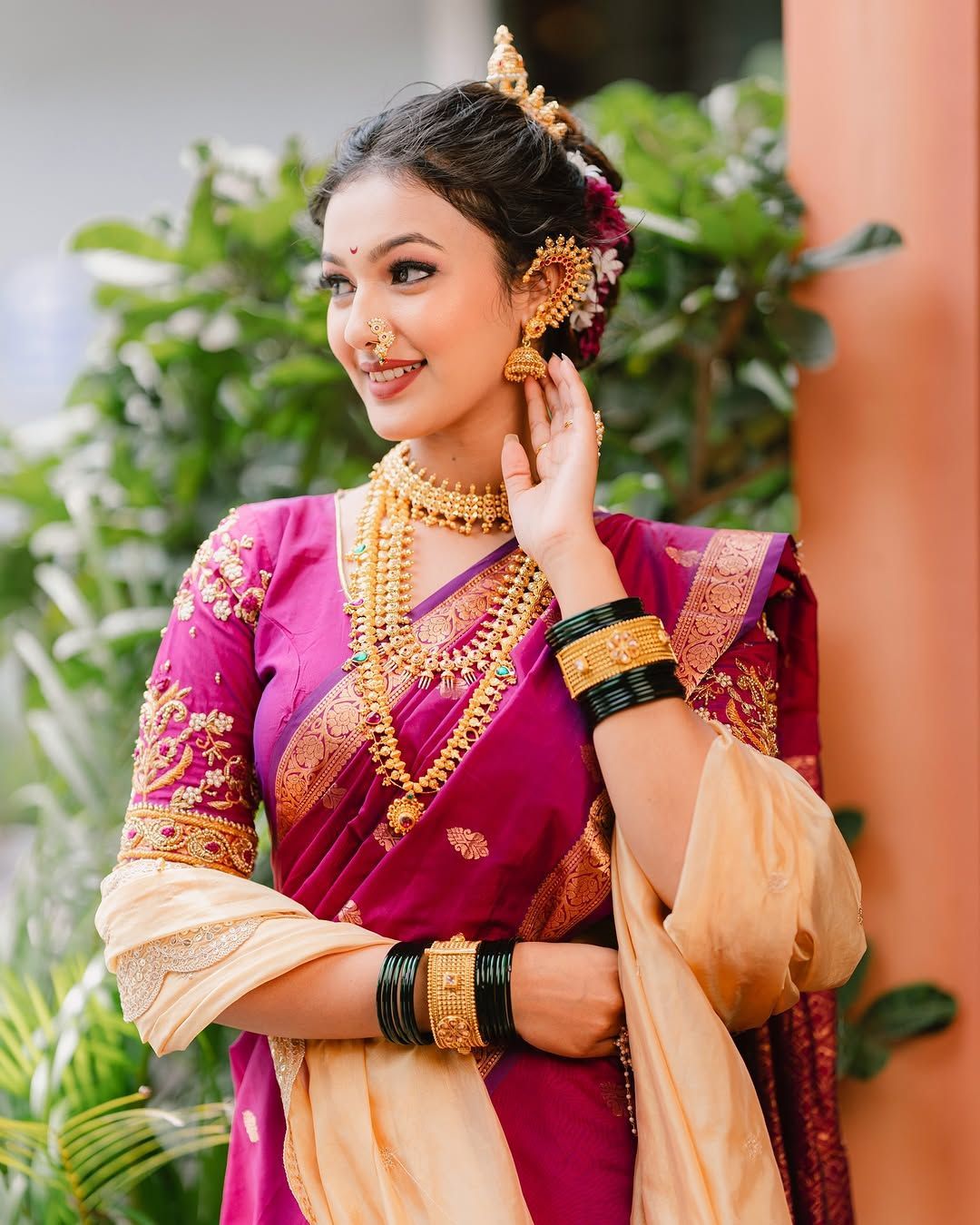
Image via Pinterest
Layering can look regal when done right, but one extra piece can tip it over. Here’s a foolproof layering formula:
Base Layer (Choker): Kolhapuri Thushi or Chinchpeti, which sits snug on the neck.
Middle Layer (Mid-length Necklace): Kolhapuri Saaj or Tanmani that rests just above the bust.
Statement Layer (Long Necklace): Rani Haar or Mohanmaal which will add drama and elongates the frame.
WMG tip - Avoid combining more than three neckpieces. Instead, balance the look with ornate earrings, hand jewellery, or a bold nose ring (nath).
Traditional Gold vs. Gemstone vs. Lightweight Options – When to Choose What
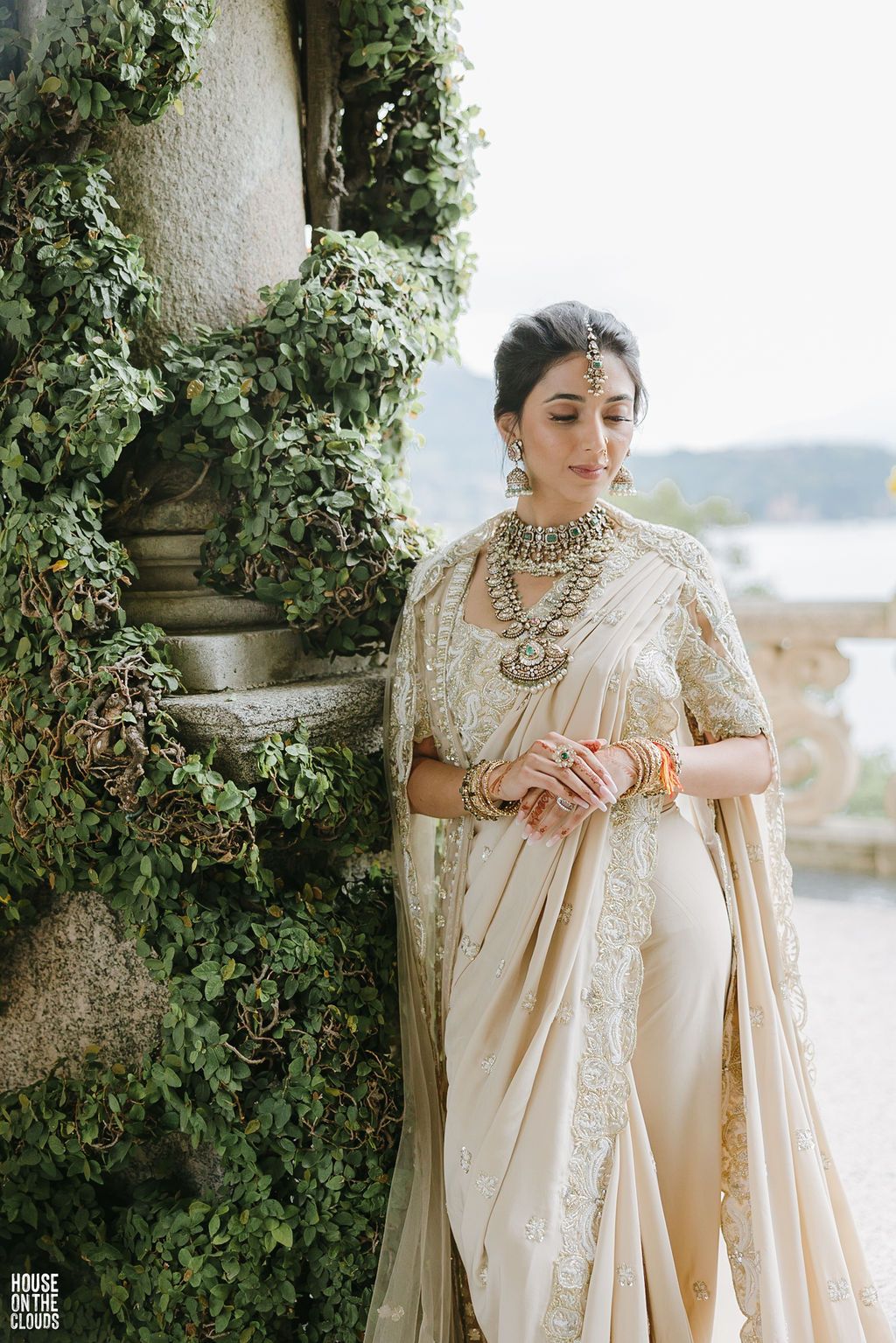
Image via Eisheta and Sarthak
Traditional Gold:
Ideal for the main wedding ceremony or traditional rituals. Pieces like Vaati Mangalsutra, Kolhapuri Saaj, and Tode are steeped in culture and best worn in gold.
Gemstone Accents:
Perfect for the sangeet, engagement, or reception. Go for emeralds, rubies, or navratna stones in Vaaki, Bugadi, or Tanmani to add colour without clashing with the bridal attire.
Lightweight/Imitation Jewellery:
If you’re planning multiple outfit changes or want comfort post-rituals, lightweight versions of Thushi, Ambada, or Chinchpeti are great. Many brides today also prefer renting these or getting silver-plated or gold-polished variants.
For Minimal Brides Who Don’t Want To Invest In All Pieces
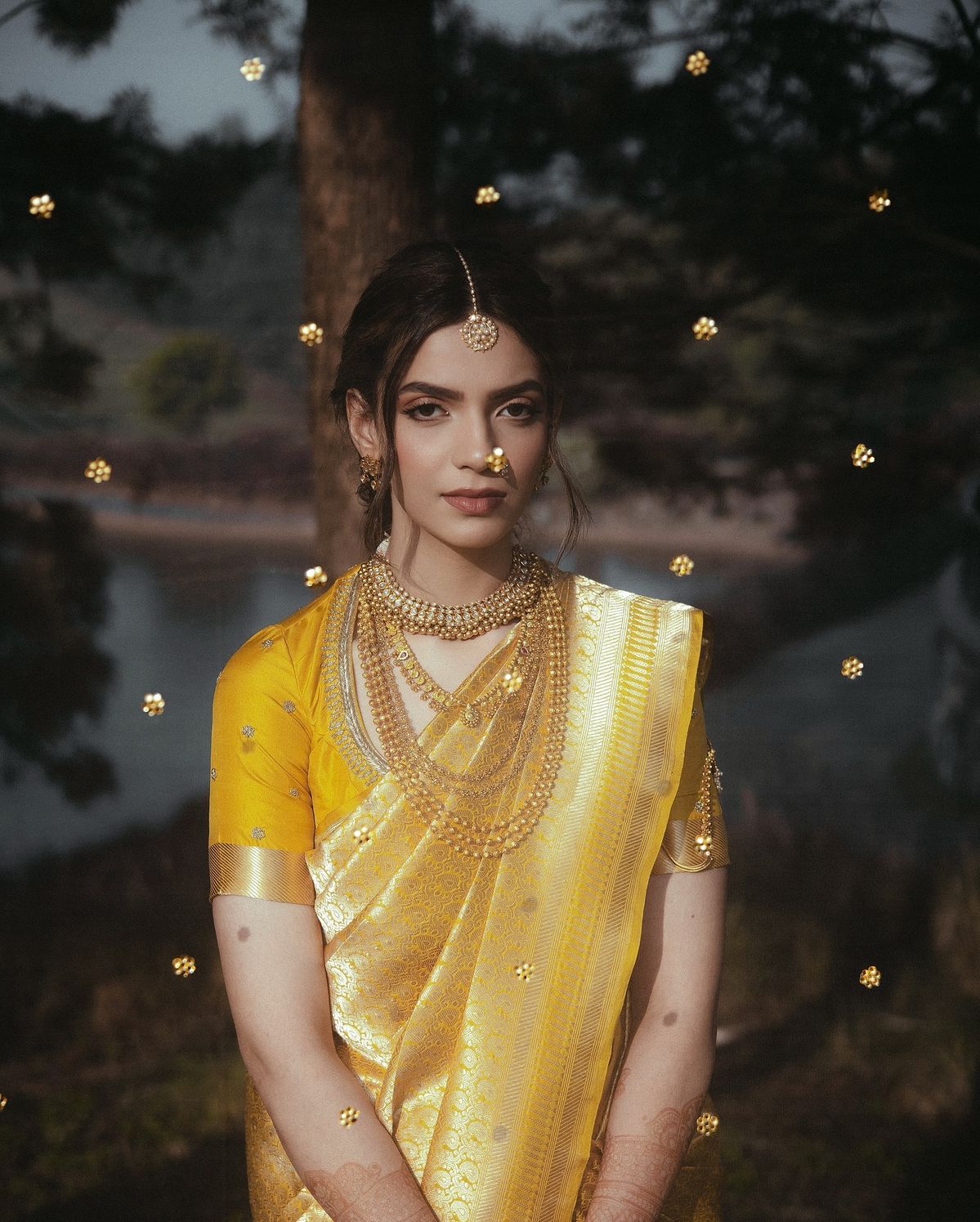
Image via Pinterest
Not every bride wants to go OTT. If you’re someone who prefers clean aesthetics, fusion looks, or minimal jewellery that still holds tradition close, here’s your essential bridal jewellery list:
Top 5-6 Must-Haves for the Minimalist Maharashtrian Bride
Kolhapuri Thushi - A classic choker with golden beads, adds instant Maharashtrian identity to your look.
Brahmani Nath - This signature nose ring is small but impactful. Wear it with or without a nose piercing.
Vaati Mangalsutra - A must-have for the wedding day. Choose a delicate vaati design or a modern, diamond-studded one.
Hirva Chooda + Paatlya - The iconic green bangles with flat gold bangles add just the right amount of tradition and colour.
Kudyas or Bugadi - Pick one depending on your style, either elegant pearl studs or quirky ear helix ornaments.
Tanmani or Chinchpeti - If you want one more addition, go for a Tanmani with colour stones or a sleek Chinchpeti. Great for layering or as a standalone piece for smaller functions. Plus, the touch of pearls is great for your jewellery trousseau.
A minimalist look doesn’t mean compromise; it means intentionality. Select a few meaningful pieces and let them shine.
There are various other designs and patterns in Maharashtrian bridal jewellery like champakali haar, jondhale haar, dholki necklace, moongachi maal, kothameerechi maal and rudraksha maal.
You can always keep an eye here for the latest Marathi jewellery and traditional Maharashtrian jewellery inspiration!
Planning a Maharashtrian wedding soon? Take inspiration from these Maharashtrian bridal looks that gave us a run for our money and also these Maharashtrian bridal looks that we absolutely loved!
Also check out Marathi Lagna Patrika Format & Invitation Templates And Lagna Muhurta In 2024: Marathi Wedding Dates


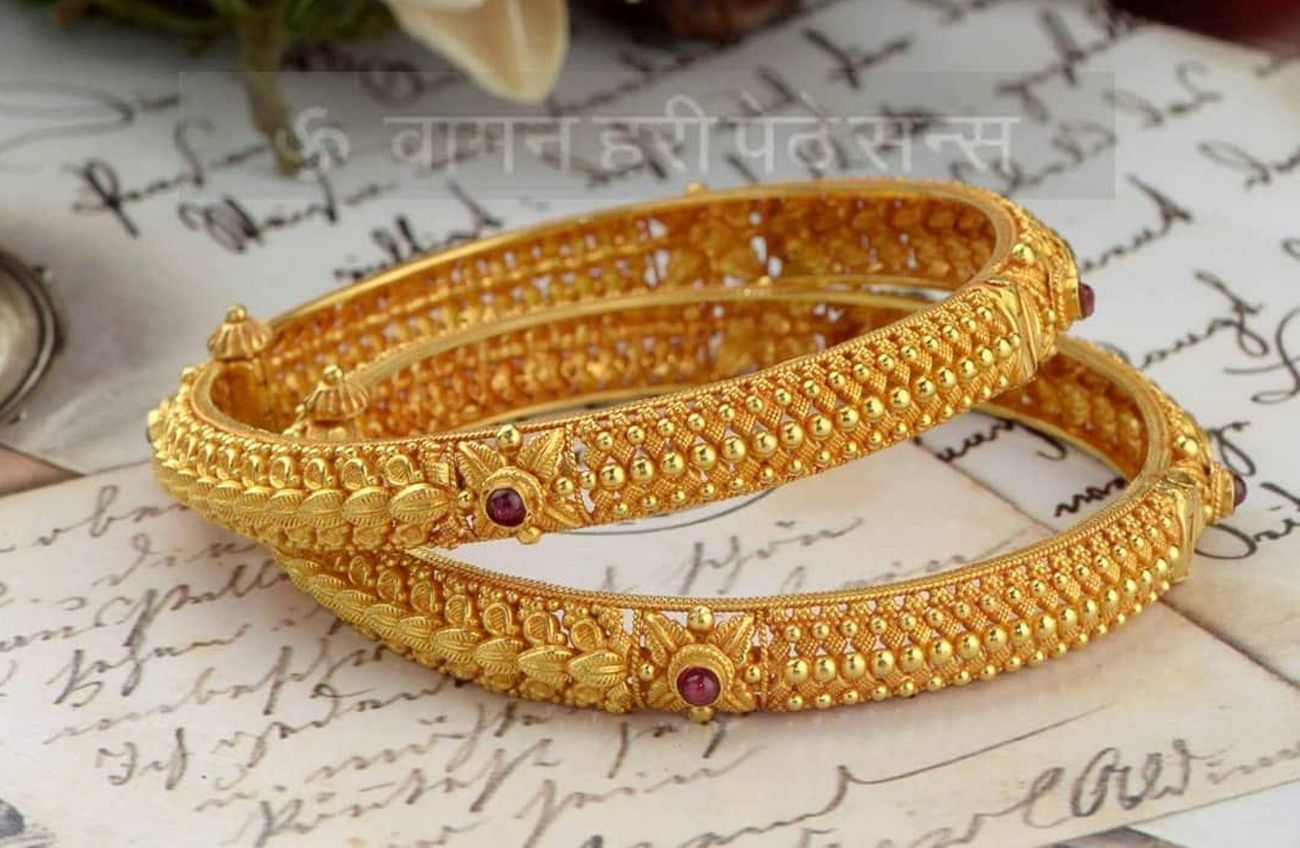

.jpg)
.jpg)

